During the days following the passing of Rev. Dr. James H. Cone, we invited guests to post memories, thoughts, or meaningful experiences they’ve shared with him. Below are the responses we received.
The passing of Dr. James Hal Cone
Dr. James Cone is considered to be the Father of Black Theology of Liberation. There is no measure of how he has influenced and influenced theological reflection from the margins both in the USA as well as in South Africa. It was at the University of South Africa in particular that Black theologians who were allowed to teach theology, embraced his theology and continued to challenge the racist status-quo that seem to opt for a theological reflection that ignored the deliberate vilification of black people merely because of their black skin. It was the very theology of Cone, which influenced the likes of Steve Bantu Biko and the Black Consciousness Movement in South Africa.
We as a South African community, we recognize the indelible contribution that Cone made to our scholarly reflections; we want to mourn his passing with his academic colleagues on the other side of the Atlantic. We also like you have lost a great mind and one of the greatest sons of Africa. We say in Isixhosa, lala ngoxolo Tata (rest in peace Father). You have fought a good fight and you have multiplied. The struggle goes on but this time, it is fought in a bolder manner because we have become many.
On behalf of the Black Theologians in South Africa, and those who remember your struggle in South Africa, we say his death has reactivated, revived our strength to continue with the fight for equality, justice and peace for all people, mostly those of African descent.
-Prof. Rothney Tshaka, On behalf of Black Theologians in South Africa
Condolences to the Cone’s Family
The echo of the fall of the Baobab Tree from across the Atlantic, James Cone, sent shock waves throughout the global South and a tremor that has left us, black theologians in South Africa particularly shaken and shattered. One of our African proverbs says, When there is a big tree, small ones climb on its back to reach the sun.
Professor James Cone’s visit to South Africa in the late 1960s coincided with the rise of Black Consciousness and the very embryonic first phase of the development of Black Theology of Liberation in South Africa. The word “liberation” is Cone’s own original coinage and proposition to the lexicon of Christian salvation, with a unique theological grammar. A student of Karl Barth, Cone in his own words turned Barth’s theology “inside out” as he struggled to find resonance between Barth’s approach to theology and the ghetto, the lived experiences of blacks in the USA and everywhere in the world. His became a mixture of the blues, Malcom X and Martin Luther King Jr, to plumb a frame of what he termed “black religion,” ostensibly, the use of faith and religiosity to resist white superiority in conditions of utter degradation and powerlessness. From the blues, in his The Cross and Lynching Tree Cone reminisces: “The sun’s gonna shine on my back door someday.”
James Cone taught us to valorise experience against the modernist myth of objectivity and self-centric universality still pervasive in theological imaginaries to this day. The lyrics and voices behind the sounds of the blues, dance and song of ordinary people announce the message and speak back to a world that oppresses the poor that “not the mules but human beings are singing.” Cone wrote, spoke, taught and waged the struggle for the black, women degraded by patriarchal bigotry and violence, the LGBTIQ communities, the differently abled people, the uprooted in Iraq and Afghanistan, Syria and the Dalit in India, yes, the marginalized and victims of the colonial matrix of power in our world today.
Sisters, brothers, children and all family members: Professor Cone has passed on, but his light now shines in his front door, it will never be extinguished. He taught we should know that crucifixion precedes resurrection. In his last major work, the Cross and Lynching Tree, he writes about “the terrible beauty of the Cross and the tragedy of the lynching tree” and is at pains to reflect on the failure of white Christianity and the white power structure to make a connection between the cross and the lynching tree.
We shall climb on this Tree, James Cone, and his resurrection is to us insurrectionist, a dense ray of sunlight against those who chose to make the connection between black bodies and the cross of Jesus, and the affirmation of life today. Be comforted and stand firm in James Cone’s light against those who chose not to.
The Black Theologians in South Africa on Thursday at 12hrs CAT will be holding a memorial service in honour of Professor James H Cone.
May His Soul Rest In Peace
University of South Africa and University of Pretoria
-Itumeleng Daniel Mothoagae
The last of the great giants
-George Boone
The Howard/Carruthers Family extend our sincere prayers, love and condolences to the Dr. James Cone Family. This giant theologian left a legacy to remember in his hometown of Bearden, Arkansas and throughout the world. Please know family, that earth has no sorrow that Heaven cannot heal. We love you.
-Rev. Alice Carruthers
The Rev. Dr. James Cone always made clear that his goal was to help students find their voice. Indeed, Dr. Cone’s “God, Suffering, and the Human Being” (Spring 2013) seminar was the finest course I took over my short, S.T.M.-degree tenure at Union Theological Seminary (2012-13). Professor Cone’s epic seminar helped me construe my own trials and tribulations as a person with a speech impediment engaging in theological discourse, where the ability to clearly and un-obstructively articulate oneself is of paramount importance. Dr. Cone was as warm as he was charismatic, as kind as he was generous, and as demanding of his students as they were of him as their ever-beloved mentor. After fifty years at my august alma mater, to say that Professor Cone will sorely be missed is an understatement.
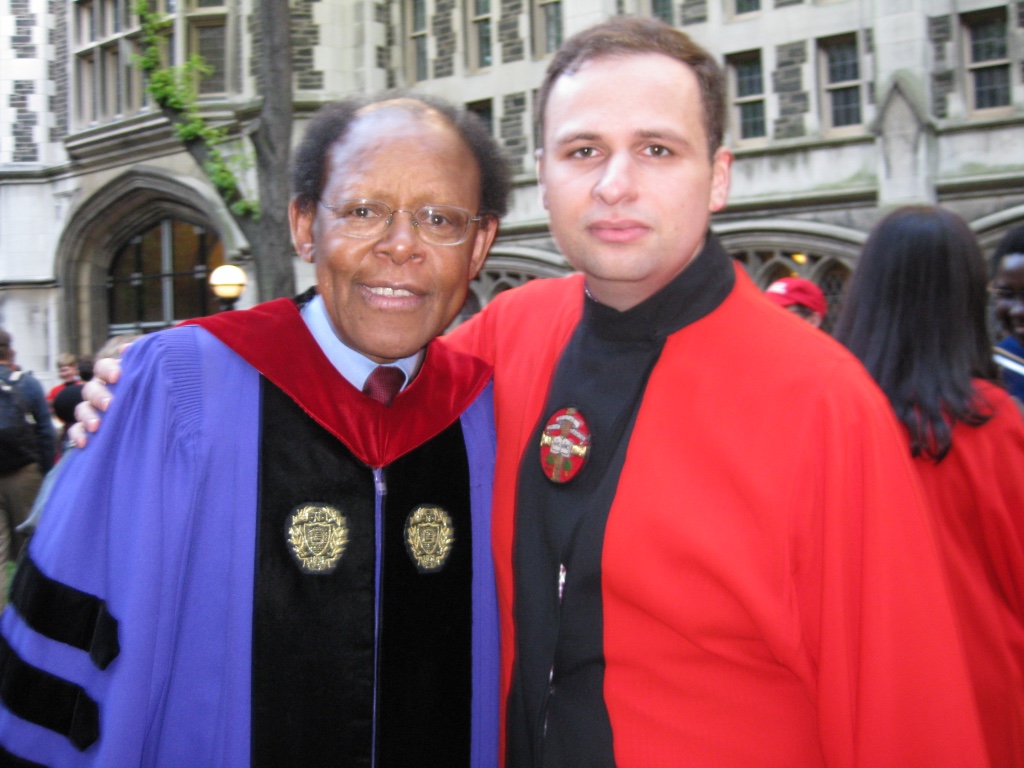
-Maksim Astashinskiy, S.T.M. ’13
Thanks for Cone is courage trough his theological writings and prophetics message. I read his writings and lissen to him every time trough youtube. His thought and legacy remain important and chalenge me to think and do more for my country as young man that going to be a minister. He becomes very important instrument in theological journay..every where we all sing song we shall overcome with Cone and Luther King Jr. May God bless his family and his prohetics spirit will continue endure as.
-Levi, Timor Leste
To the Faculty and Student Body of Union Theological Seminary, please accept my most sincere and heartfelt condolences on the death of Dr. James Hal Cone–your revered colleague, teacher, mentor, and friend. I too feel his going out from us deep in my heart. May I share with you a few words from another theologian, Karl Rahner, SJ, words that offer me some consolation: “The great and sad mistake of many people … is to imagine that those whom death has taken, leave us. They do not leave us. They remain. We do not see them, but they see us. Their eyes, radiant with glory, are fixed on our eyes. … Though invisible to us, our dead are not absent. … They are living near us, transfigured … into light, into power, into love.” May we find strength and courage in Jim’s goodness and power and love.
-Shawn Copeland
It is with a deep sense of indebtedness (with utang na loob, as Filipinos would say) and thus with a deep sense of gratitude that I remember James Cone. With his Black Theology & Black Power (1969), A Black Theology of Liberation (1970), and God of the Oppressed (1975), and his subsequent powerful teaching/lecturing, he upended the field of theology by making it explicit and self-evident that theologizing is always and necessarily contextual and therefore that it must be an ongoing ethical call for justice for the oppressed. Of course, theologians are indebted to James Cone. But so are we, biblical scholars. He also upended our field by demanding that we recognize and acknowledge that any scriptural interpretation is contextual and therefore that we have an ethical responsibility for the interpretive choices we necessarily make. Because of James Cone, we can no longer avoid the question: How does this interpretation affect the oppressed? With utang na loob and deep gratitude.
Daniel Patte. Professor Emeritus of Religious Studies, New Testament and Christianity. Vanderbilt University
-Daniel Patte
He said that white men cannot be free until black men are free. I heard, as a woman, no man can be free until women are free. Bless you and rest well, Brother James.
-Sara Baldwin
Whether they hear or refuse to hear (for they are a rebellious house), they shall know that there has been a prophet among them. Ezekiel 2:5
A prophet bid farewell today.
Not with a casual wave of hand but rather with a massive wave of transference that should make every pastor, theologian, activist, and preacher who recognizes God in the places and faces we are collectively less apt to serve, stand a little taller, proclaim a little louder, and study a little harder to grab firm hold of the whirlwind that has passed our way.
Since hearing of the death of the Rev. Dr. James Hal Cone, my heart has been deeply grieved. I’ve searched for words to pay proper tribute to a master scholar who loved the Christian church enough to dare dig beneath its carefully coifed soil and disturb its racist roots. He is rightfully known as the Founder of Black Liberation Theology and while I honor this designation that Dr. Cone so rightfully deserves, somehow today it seems woefully inadequate for the prophet who walked among us, shaping and giving voice to a theological understanding of God that serves as an anecdote to the intoxicating idolatry of white supremacy infecting both church and academy far too long.
It is Dr. Cone who dared to remind us God is not made in the image of whiteness but rather it is we, all of us, who are made in the image of God. Therefore, if one cannot see God in black bodies, in LGBTQ bodies, in economically deprived bodies, in migrant bodies, in disabled bodies, in “othered” bodies, and worship God there, then one is incapable of seeing God at all. Dr. Cone reminds us God loves Blackness and the message of the Gospel is a love letter to the oppressed. “To be Christian,” Dr. Cone says, “is to be one of those whom God has chosen. God has chosen black people.”
Today I honor Rev. Dr. James Hal Cone as prophet. I honor him as the Founder of Black Liberation Theology. And I honor him as a spiritual doula because that is what Dr. Cone is to me. A doula. I did not have an intimate relationship with his person. I was not privileged to sit in his classes or benefit from his mentorship, and yet his work has shaped me in undeniable ways. His wisdom. His clarity. His blackness. His unapologetic love for the black church and his hope for the church to come. His unrelenting understanding of a God who includes all…helped me to push! And I’m still pushing because of a prophet named Dr. James Hal Cone who helped me give birth to the voice of God in me.
This prophet who walked among us, Rev. Dr. James Hal Cone.
– Rev. Traci Blackmon
Our world was diminished and the heavens were enhanced with the passing of Rev. Dr. James Hal Cone.
Rev. Cone was an absolute scholarly giant; the founder of Black Liberation Theology, and a teacher extraordinaire, responsible for shaping the hearts and minds of preachers and scholars over generations. Rev. Cone endlessly challenged Christians to be drawn to the liberating character of Christ, to the parallels between the cross on which Jesus died, and the lampposts and trees that served as the tools of assassination of so many of our ancestors.
I recently witnessed the presence and power of the new National Museum for Peace and Justice, a memorial to the more than 4,400 African Americans – men, women, and children – that suffered from all forms of racial terrorism. They were lynched, burned, shot, drowned and beaten to death by white mobs. Of course, those very same people, the ones directly involved in the killings, those that witnessed and even celebrated them, and those that might have felt a tinge of guilt, but did nothing to stop the killings, the vast majority would most fervently attest that they were Christians. Rev. Cone and his teachings stood in defiance of this disturbed thinking.
Black Liberation Theology makes clear that the bible was written from the perspective of the oppressed, and that Jesus himself was a liberating force. “Any theology that is indifferent to the theme of liberation is not Christian theology,” is one of his most referenced quotes.
As I consider his passing, the vacuum create by his absence is considerable. I am, however, comforted by the incredible pool of scholars, activists, preachers, and theologians that he has trained and influenced over the many years that God gave him.
May the spirit of Rev. Cone rest well, after a life truly well lived as a blessing to us all.
– Rev. Dr. Otis Moss III
In the early years of my evangelical faith my mother, who helped open the SNCC office in Philadelphia when the struggle moved north, challenged my understanding of faith’s focus.
“Why,” she pressed, ” do you think White people focus on forgiveness while Black people focus on liberation? Could White faith be the answer to White souls’ cries for forgiveness while Black faith answers our cries for liberation from the sin levied against us?”
I was 18 years old. Before that moment I had no idea my mother thought about issues of faith. Yet, with that pointed question she introduced me to Dr. James Cone, whose work comforted and guided her when the movement dissolved. Dr. Cone’s A Black Theology of Liberation sat at eye level on the book shelf in my White pastor’s study when I came to him in my waking up years and challenged the faithfulness of the blond-haired, blue-eyed Jesus that hung high above our Nazarene heads every Sunday morning. And years later I had the profound fortune to offer reflections on Black Liberation Theology at an American Academy of Religion (AAR) Kinetics Live forum where South African theologian Dr. Allan Boesak offered the keynote address. Dr. Cone stopped through to lend his support for the conversation. He beamed. He was both grandfather and midwife to our conversation.
Dr. Cone’s gifts to the world were always presented wrapped between two covers. Through The Cross and The Lynching Tree, in particular, Dr. Cone taught me what it looks like to interrogate the most basic assumptions of colonized faith. Each book pressed us to think differently, to resist the oppressors’ view of subjugated flesh; rather to see the world and faith and God and each other and our current condition through woke eyes embedded within that flesh–eyes closer to the social location of the original writers and hearers of the Biblical text than of any theologian interpreting that text from the social location of Caesar.
We say, “Thank you, Dr. James Cone. Thank you for bearing your particular burden–to help us see Jesus…better.”
– Lisa Sharon Harper
Growing up in the Bible Belt as a white girl I was taught white history and white theology. It has and will take a lifetime to undo my white privilege.
As I came of age, I felt challenged as I saw racism around me. I read about Jesus’ mission statement in Luke 4:18 “I have come to free the oppressed.” And I began to wrestle– who was Jesus? It wasn’t until I read Dr. James Cone’s work that I had words to express my growing faith. Cone gave me words for what I knew spiritually but could not articulate theologically.
I had to fight to be taught about Cone in graduate school. This made the class all the more delicious. I was attending seminary in the nineties when a group of us challenged the administration to offer liberation theologies. It helped that one of the professors, who had been a student of Cone’s, stepped up and offered to teach it. It often seemed as though only theologies taught from a Western, white, male perspective were considered “legitimate.”
Cone wrote, “Any talk about God that fails to make God’s liberation of the oppressed its starting point is not Christian.” He said that Jesus was black. This was beautifully earth-shattering for the class of majority white students accustomed to white cultural power. Cone explained further that “being black in America has little to do with skin color. Being black means that your heart, your soul, your mind, and your body are where the dispossessed are.”
There was a time I almost left the church. Now I lead a network of tens of thousands of leaders seeking to live out the biblical call to free the oppressed. I owe that to James Cone.
– Rev. Jen Butler
Dr. James H. Cone introduced me to Black Liberation and Liberating Theology at a time in my life when I was emerging from an apolitical, theologically ultra conservative Church environment. My experience with Dr. Cone, both in the classroom and reading his books, gave me a fresh vision of Jesus as Liberator and our responsibility to DO justice. Dr. Cone’s presence in my theological formation was the soil for my evolution to Womanist and LGBTQ Liberation Theology.
Our encounter shifted my whole life narrative.
Every day, as a Black same gender-loving woman of faith, I see and embody the parallel between the Cross and the lynching tree. Anyone who has been liberated by my writing, teaching or preaching, owes this great Mentor a debt of gratitude.
Dr. Cone you have moved on to your next assignment. You will live on in us who were elevated, inspired, and empowered by your words, your life, and your immortal legacy.
Rest well, Sir.
-Bishop Yvette A. Flunder
I was heart-broken to hear of the passing of Dr. James Cone, a legendary theological professor. Having taken many classes with him at Union Theological Seminary in New York, and having taught his work at New York Theological Seminary, Cone’s theological vision has permeated my own evangelical theology.
Theology is not primarily about interpreting the world, but about constructing a more just and equitable world through bearing prophetic witness to Christ and the Kingdom. Forged in the fires of the Civil Rights and Black Power movements, James Cone’s Black Liberation Theology offers a courageous critique of the whiteness of American evangelical theology, a prophetic Christian theology relevant to black existence in a nation dominated by white supremacy. After Cone, evangelical Christians can and should be unapologetically Black and unapologetically Christian.
Liberation is the heart and soul of the Gospel. White evangelicals have demonstrated a commitment to thinking carefully about Christ and culture; now is the time to have an honest conversation about race in American society that includes the Evangelical Church, and Cone’s life’s work and death offer us the opportunity to reflect more deeply and deliberately during difficult days.
– Rev. Dr. Peter G. Heltzel
Any message that is not related to the liberation of the poor in a society is not Christ’s message. Any theology that is indifferent to the theme liberation is not Christian theology.
Jesus is anointed to preach good news to the poor, to liberate the captives, to give sight to the blind, to let the oppressed go free. That’s his call and the call of the Church everywhere. If we aren’t doing that, we are not the Church. If we participate in the suffering of the marginalized with our indifference, we are not the church. If we are not disrupting the myth of white supremacy and manifest destiny, we are not the Church. This is our vocation. Disruption is a holy act, passivity a sin. Christianity herself must be liberated from white supremacy, greed, ego and the lie of manifest destiny.
This is where it started for me. I’d earned my M.Div. from Princeton Theological Seminary and Dr. Cone was my personal adjunct professor of soul transformation. I fed my growing discontent with the churchy-ness of American “Christianity” on his brilliant fire, particular mind, and prophetic truth telling. His tutelage gave me the courage to stay in the church, to go back to graduate school, to gain more tools of disruption, and to work to free her and her people from broken theology, warped by hegemony. He inspired me to preach and teach outside of the box, to create new theology—womanist, liberation, universalist and Christian.
The Rev. Dr. James Hal Cone helped me to find a grown-up God of liberation and Revolutionary Love.
– Rev. Dr. Jacqui Lewis
God bless you, professor to my soul. We who believe in freedom are your legacy; we will not rest until freedom comes.”
-Susan Barnett
I wanted to share a shirt we did to honor Dr. James Cone about two years ago with his blessing.
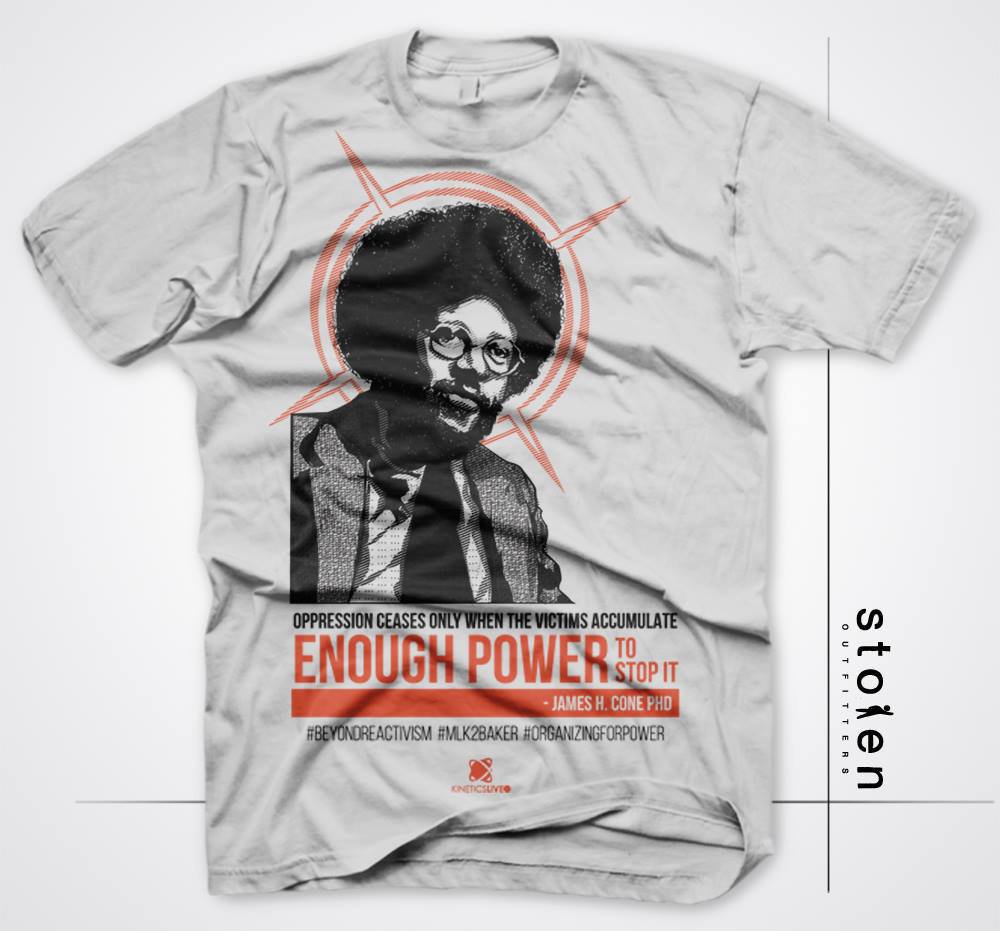
–Jamye Wooten
Dr. Cone was a brilliant theologian, humble, hysterically funny, an incredible lecturer and all-around nice guy. And the orange socks. I’ll never forget his orange socks. UTS and the rest of his family, friends and colleagues will sorely miss him on many levels. I’m saddened by his passing but hopeful in the Resurrection and so thankful for his life.
-Denise Weber ’93
Knowing that death is inevitable, nonetheless the temptation to view some as immortal is an eveeeeeer-present reality within the scheme of human living. Dr. James H. Cone was one whose presence many took for granted, including myself. Admittedly, I never thought of him not being physically among us. He was a fierce lion for the cause of Black Liberation Theology.
I was first introduced to Professor Cone when I was a student at Perkins School of Theology, Southern Methodist University. He was invited by the Black Seminarians. Though I was raised in an authentic Black Congregation, it was Cone’s theology that spawned my theological gyrations in many ways as it relates to the nature and purpose of the Black religious tradition, particularly the Black Church. Without knowing at the time, Cone’s treatise on the subject has been my lifetime work for the past fifty years as a minister of the gospel. I am proud to proclaim that Dr. Cone was an often invited guest at my congregations in later life and a guest par excellent in my home. My children, now adults, continue to glean from his presence, wisdom, and superior theological insight.
With the exception of Jesus, my father, and the late Dr. John H. McKissick, no other religionist has had such an impact on my ministry, theology, and personhood. His work in the arena of theology can be summed up in Niebuhr’s contention of “impossible possibilities” becoming live options for those who dared to be challenged by his vast scholarship.
Dr. Cone – brother, friend, scholar, rest well. “You fought the good fight; you kept the faith…”.
REST IN ETERNAL PEACE!”
-Dr. Charles Reese
Professor Cone was a theological giant who broadened theological discourse to include issues many felt uncomfortable talking about, but issues which were at the heart of theology and the religious imagination such as race and justice. He was an excellent speaker who invited, provoked, and moved you to think. One of the lasting memories I have of Professor Cone was hearing him deliver the Shalom lectures at Augustana College in Sioux Falls in South Dakota on Martin, Malcolm and America: A Dream or a Nightmare, the text of which became his seminal book by that title. Cone brought the full scope of black and human liberation in that lecture years before Spike Lee’s movie on Malcolm X.
-Elias Bongmba
Sadly, I am just learning of Dr. Cone. I look forward to getting his memoir later in the year that I may learn more. Our condolences to his family.
Brandie Abraham-McCreary
“There will NEVER be another Dr. Cone. Brilliant, honest, and one heck of a smile! Thank you for all of your work and commitment to liberating theology!
Love,
-Zakiyyah Ali
“I feel so shorted and so blessed! Shorted due to I only heard his name upon his death .and I only knew of his death from my smartphone who picked up the conversation of how a black man has been found hanging in the HBCU area in Atlanta Ga, thus the lynching was talked about the Phone recognized Dr. Cone by the word lynching and his death was made known to me and with that knowledge I explored his work and cried that his name had never been spoken in my home, my church, my school .
To the Family Friends and students of Mr. James Cone, my deepest sympathy and love,
-Kimberly Madison
“Dr. Cone had a beautiful, loving, and revolutionary soul. It was a great pleasure when he and I would communicate through email.
He will be greatly missed. And his work, his words, his example, his life, will remain with us forever.
With deep respect and love,
-Dr. George Yancy
While I have never met Dr. Cone, he changed my way of thinking in his transformative way! His thought-provoking books and lectures help one look hard at oppression, racism, and injustice. More importantly, he helped me understand that “thruth” liberating and it must be spoken. We thank God for his voice.
-Dennis
Dr. Cone was amazing scholar and good friend. As the Founding Executive Director of the Social Justice Institute at Philander Smith College I was in conversation with him about naming the institute after him. As a distinguished alumnus of Philander Smith College it seemed fitting and appropriate that any type of justice work in central Arkansas be done through the lens of Dr. Cone’s scholarship. He reluctantly declined because he never wanted to be a public intellectual and wanted only to be left alone to read, write and teach. He is still deserving of this honor and I hope that someone somewhere takes up the mantle to honor this once in a generation scholar. I am saddened that I was unable to convince him to be a part of this vision, but happy we became friends.
As fellow Philanderian I have stated publicly that James Cone is the greatest alumnus to graduate from the college. James Cone is to theology as is Plato is to Philosophy and generations from now people will be reading and studying his work. Rest in power Dr. Cone and we will see you on the other side.
-Dr. Joseph Jones
Dr. Cone, a theological giant of this age, will forever be carved in the annals of Western Theology as one who differentiated the inactive academic NOUN in the studies of theology and the knowledge base of the active VERB in the studies of Black Theology. One can no longer be theologically stagnant after studying Black Theology.
-Hilary H. Battle
Dr. Cone, the theological giant of this age, has forever carved a truer image in the hearts of responsible and accountable people of what the Christian faith truely is.
Western theology will forever not be viewed as just an academic inactive NOUN; but rather with the teachings of Black Theology is now a knowledgeable active VERB.”
-Hilary Battle
Thank you for making clear to me that Black Lives DO Matter!
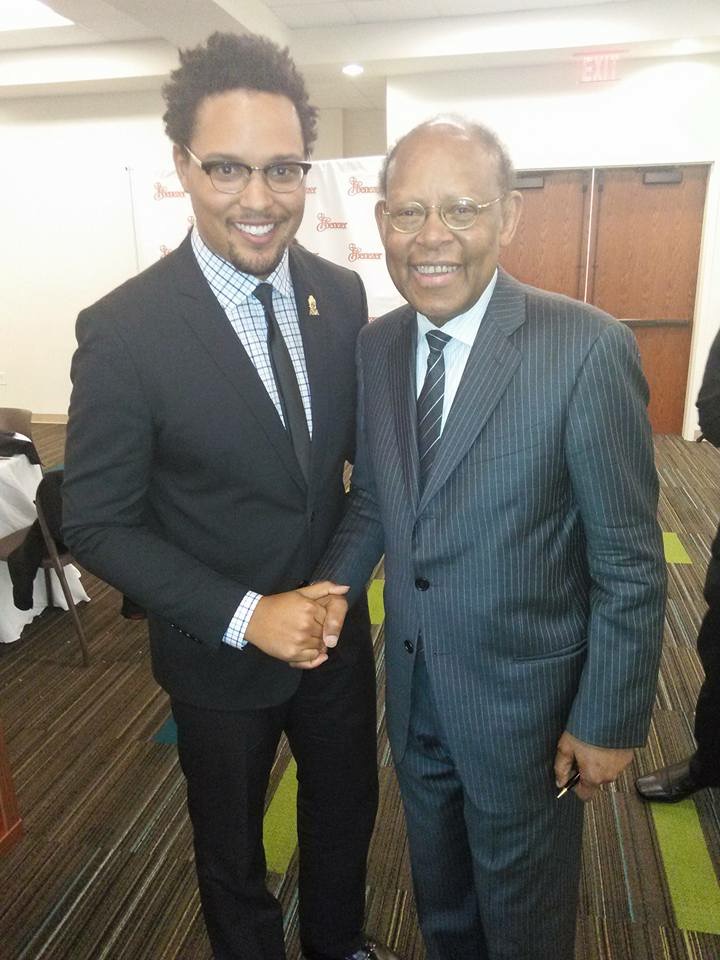
-Bronson Woods
Dr. Cone encouraged me to write, write, and write some more.
I was lucky enough to be one of his TAs, and it was the most intimidating yet fulfilling decisions I made as a doctoral student in another department. He saw potential in me and encouraged me to think sharper, write daily, and theologize contextually.
What a theological giant, yes.
But what a mentoring teacher he was and always will be.
To his family–thank you for sharing your father’s time and commitment with us.” Aram Bae
“Here are my reflections about the life and work of James Cone.
https://www.tikkun.org/tikkundaily/2018/04/29/in-honor-of-james-h-cone/#more-64916
I am grateful that I had the opportunity to be in his presence. He blessed us beyond words.
Peace,
-Valerie Elverton Dixon, PhD
“During my first semester of seminary I was awestruck. My biggest class was Introduction to Theology with Dr. James Cone. Each week I sat in the front and just soaked in every lecture. By the sixth week, when we got to Black Theology, Dr. Cone preached—because anyone who knows him knows he preached, not lectured—about the method and analysis of Black Theology. When he opened up the floor for questions I raised my hand. Nervous yet confident I asked Dr. Cone what he meant by “Black” in his theology, because I wasn’t sure he was speaking about the realities of Afro-Latinxs and other African/African-diasporic people’s. Instead of becoming defensive because I was challenging *his* work, Dr. Cone looked at me and merely responded, “well, it sounds like you got a project!” He continued, as he often did, by stating the importance of “finding your voice”—understanding your positionally in the world, wielding your story, and speaking with the people in your community. Dr. Cone could have trashed me right then and there for even daring to challenge this veteran, this patriarch. Yet he didn’t. Because Dr. Cone wasn’t interested in defending his project, indeed his project could speak for itself. Instead he was interested in having people find their voice, find their drive, find that fire deep within them to do something greater than he ever could. And for me, as a first-year masters students, that spark Cone gave me changed my view of self as a scholar and as a person. It gave me confidence to engage my work differently, to dare. Put differently Dr. Cone tapped into that which was there all along, and pulled it to my center. And because of that I was never the same.
A few months later we were at the American Academy of Religion. Dr. Cone was going to deliver the Niebuhr lecture, and I spotted him outside the conference room preparing his notes. I asked if I could sit next to him and if he felt prepared for his address. He looked at me and said “I’m gonna light them up Jorge!” I ask why? And then Dr. Cone said as only Dr. Cone could, “because the academy thinks it’s incredible but it’s really just full of irrelevant bull shit! They talk about the poor and oppressed and don’t do anything to actually affect change outside these damn walls!” So I looked at him and jokingly say, “well, it looks like you’re going to light them up indeed Professor” and we just laughed. We sat for a few more minutes before he proceeded to light them up.
That exchange meant so much to me. It was simple, and funny in some ways, but it showed me so much about Dr. Cone. It showed me that even with the fame and notoriety, at the end of the day his heart was with his people. And because of that at a certain point he realized that freedom, or at least the potential for freedom, demands that we call bull shit, bull shit…
Months later I was with Dr. Cone in his apartment and he actually thanked me for sitting next to him that morning at AAR. He said having someone with him helped him reach deep into his voice. His comment felt so random because we were at his place to discuss my Ph.D. application. I had asked him to be one of my recommenders so he invited me over to talk about my academic interests. He told me to bring cheese and crackers to pair with white wine. I brought bravearían red and triscuits, which he loved so much that in the next few events he hosted he served *that* cheese. It was something we laughed about for months to come.
While in his apartment I told Dr. Cone about my interests in applying to history programs over theology, about the questions I had, about my dissertation ideas. And I’ll never forget that Dr. Cone looked at me and said “oh yes Jorge, you have to become a historian!” I remember being so thrown off that this world class theologian would say this. But he continued: “you have to become a historian because historians change the world.” For Dr. Cone, only those who truly understood the past could motivate others to change the present and, even more, to press the future. That’s why so much of his work was historical, examining the context before articulating a theology.
And Dr. Cone was extremely supportive of my application because he said I had found my voice—something which still means so much to me.
Like all of us, Dr. Cone was a complicated figure. He made mistakes—mistakes that affected people close to me—and had his own limitations in perspective. And also, when I met and developed a relationship with Dr. Cone, I encountered an individual who was reflective on his life and interested in pouring into the next generation. Dr. Cone was an inspiration for me personally, an individual who saw something in me and went out of his way to tap it out. And like me, I know there were others he fed with life. So for me, his loss isn’t just about losing a Professor whose class I once took. His loss is about losing a Professor who inspired me to greatness, and consistently walked alongside me, challenging me to never be trapped by the bull shit, to never forget my voice, and to make sure I changed the world.
Rest in power as you join the ancestors Dr. Cone. Thank you for inspiring so many of us to find our voice.
Link to tribute above: https://www.jjrodriguezv.com/single-post/2018/04/29/A-Tribute-to-Ancestor-James-Cone”
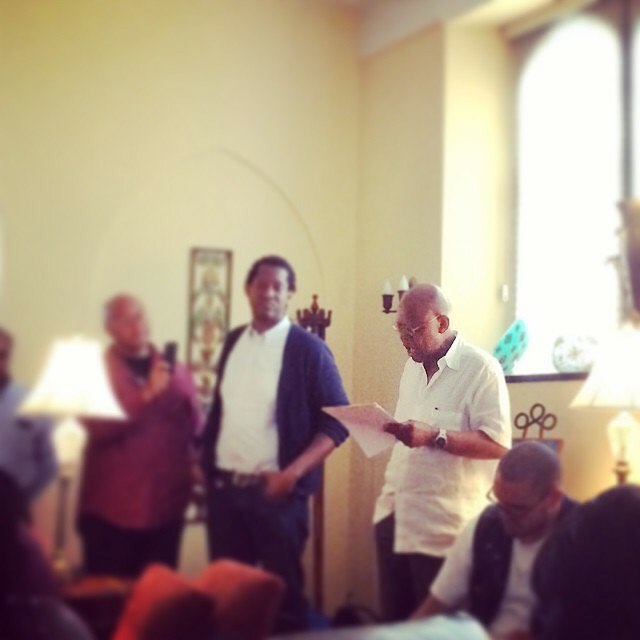
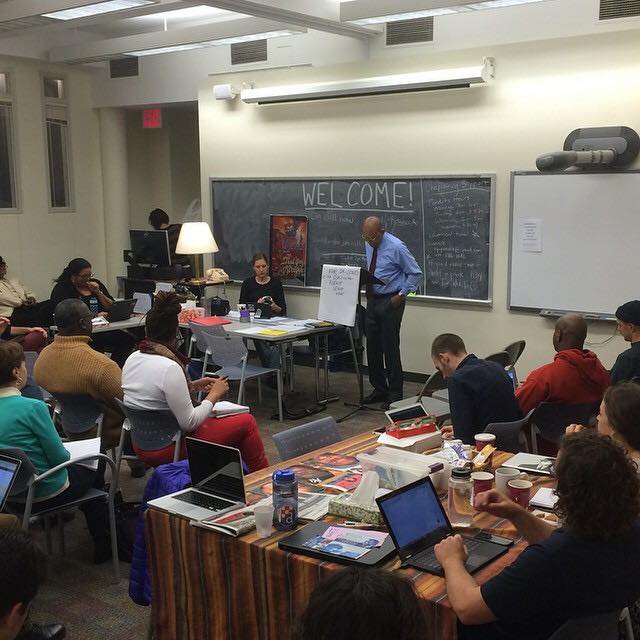
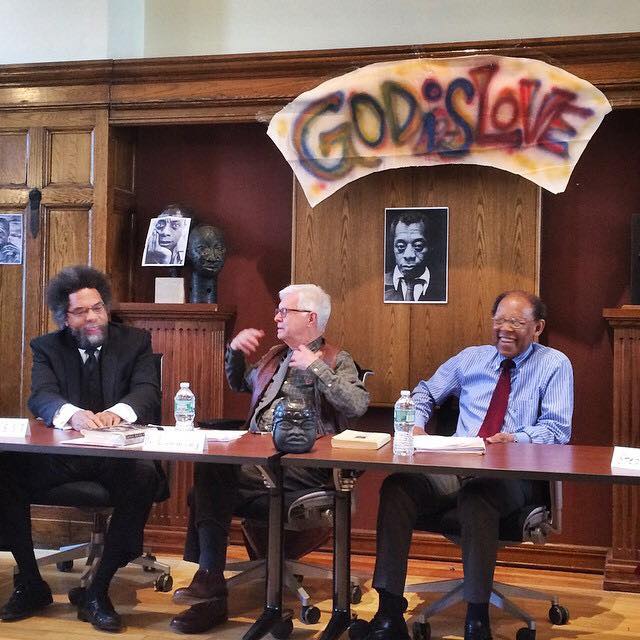
– Jorge Juan Rodríguez V
“To Dr. Cone’s family and friends: I am so sorry for your loss.
I read James Cone while I was an undergraduate who had recently become a feminist and his work added a critical layer to my understanding of oppression and power. I was thrilled to be accepted into the Union’s MA program (class of 1995) and be able to actually take a class from him! He did not disappoint. However, when I think back to classes with him I not only remember his brilliance but his deep kindness and care for all of his students. He was so encouraging. He inspired me to work to end violence against women and, more recently, in advocacy and support for formerly incarcerated people.”
-Elizabeth Gay
When God said, “Whom shall I send? Who shall go for us? My people are perishing, because of racism and white supremacy,” Rev. James Cone said, “Here I am. Send me Lord, I will go. I will go to proclaim the gospel of freedom and justice against the shackles of racism and white supremacy in North America and the world.”
We are grateful to God for the life of Prof Rev. James Hal Cone and the intellectual rigor and passion in the service of justice, especially against racism of all sorts. He embodied the struggle against racism and white supremacy without faltering for five decades of his socially engaged scholarship. As he passes on, the lamb of his voice remains loud and clear, proclaiming justice in the valleys where demons of racism continue to haunt our world. His voice remains a call to all us–reminding us that the struggle continues.
We have been so blessed to have Rev Prof James Cone as our teacher and pastor. May his soul rest in peace. A luta Continua!
-Musa W. Dube, Botswana
Indeed, blessed are we whose lives coincided and overlapped, for a while, with that of James (Jimmy) Cone. The influence of James Cone in Africa is greater than it is often imagined. I am aware of at least two key African theologians supervised by Jimmy – one a Malawian and the other Emmanuel Marty in Ghana. Not to speak of his enormous influence in (South) Africa – Itumeleng Mosala, Jean Marc Ela, Gabriel Setiloane, Takatso Mofokeng, Desmond Tutu, Gideon Khabela, Cecil Ngcokovane, Simon Maimela, Allan Boesak to mention but a few.
One of the areas in which James Cone was more influential than either Malcolm X or Martin Luther King Junior (his own mentors) is in South African politics – at the time when many South African political politica leaders were languishing in prison – was in politics. Much in the South African Black Consciousness philosophy and its attendant Black Theology – propounded by Steve Biko and was taken from James Cone, whose writings were banned in South Africa at that time.
We talk a lot about innovation today. James Cone is a theologian who innovated and originated an entire political philosophy and theology. No one has captured the scandal at the heart of colonial Christianity better. Nobody has captured the tragedy of black Christian faith better. As Vuyani Vellem has said to me, James Cone’s “The Cross and the Lynching Tree” is such a fitting final chapter from this theological titan. Here is a man who uttered the most frightful phrase of his time – Black Theology. The two, theology and blackness, had never been imagined together. They never were conceived side by side. To utter the phrase was ‘heretical’ and ‘career limiting’ even for a Karl Barth student that Jimmy Cone was.
Let us think together about ways of deeply honoring his memory.
–Tinyiko S. Maluleke, South Africa
May the legacy of Jim Cone continue to spur on generations to come.
–Mercy A. Oduyoye, Ghana
I think of the many scholars that come to mind, it is safe to say Professor James Cone revolutionized theology and the theological imagination and its praxis in relation to the Black world. The rest is a great intellectual tradition. It will be fitting to do a big conference to honor him in Africa.
-Elias Kifon Bongmba, Cameroon
May the man who inspired me, and so many others, rest in peace. His legacy lives on in his manifold works and the work of liberation. A luta continua!
-Robert Wafawanaka, Zimbabwe
He has left a mark with his brand of theology; authentic, contextual and emancipatory. He has begotten daughters and sons who have taken up the baton and are running with it. I have a copy of Theological Studies vol.61 (4) of 2000 entitled The Catholic Reception of Black Theology. I had marked in it the following words from the editor, Michael Fahey, “After long silence, Theological Studies has begun to make amends for its shameful avoidance of the evil of racism in the United States. To accomplish this task, the editorial board has invited a team of African American Catholic theologians to reflect of this painful neglect especially in the light of the thirtieth anniversary of Black Theology of Liberation by James Cone, who also participates in this analysis.” I have stubbornly kept this copy to myself. Others I have read and I cannot even remember where they are. When I am down and in despair, I am encouraged by Cone’s words, “It seems that there is nothing Black people can say or do that will wake White theologians out of their slumber. But we must keep trying to shake them out of their indifference to “one of the most shameful scandals of modern Christianity.” Racism is a profound contradiction of the gospel. No one, absolutely no one can be a representative of Jesus and treat others as subhuman. There can be no compromise on this point.” He may be gone but he has planted the seed and that seed must grow because Professor Cone was sent by God for a purpose and that purpose was Liberation for all both black and white. Unless we are liberated whites will not live in peace. Only if we are liberated and they are liberated can we all live in peace of the children of God.
–Paul Leshota, Lesotho
Dear Colleagues. Professor James H. Cone is one of my Mentors. I first met him 6-8 June 1973, during the first meeting between African and African-American Theologians, which he hosted at Union Theological Seminary. The meeting was labeled “exploratory”, and I was the youngest among the eighteen of us. Those of us from Africa included Professor John S. Mbiti (Kenya); Professor Kwesi Dickson (Ghana); Professor Christian Gaba (Ghana); Professor Edward Fashole Luke (Sierra Leone); Rev. Desmond Tutu (then with Theological Education Fund), and me, Jesse Mugambi – then at the University of Nairobi. The African Americans included Prof. James H. Cone; Prof. Gayraud Wilmore; prof. Charles Long; Prof. Herbert Brown; Prof. DeOrtis Roberts; and Prof. Princeton Williams; Dr. John Bennett; Mr. Shelby Rooks and Mr. George Thomas
In November -December 1975 I was privileged to facilitate Professor Cone’s participation in the WCC Fifth Assembly at Nairobi. His well-attended public Lecture at the Catholic Chapel within the precincts of the University of Nairobi remains memorable to me, particularly because of the exchange of perspectives between him and prominent European Professors. Cone brought some copies of his books, which might have been the first parcel of his publications to reach Nairobi.
These encounters have remained embedded in my memory, and constitute an integral part of my perception of what contextual theologizing is about. It is my hope and prayer that Professor Cone’s legacy will remain exemplary for African theologians, as it has been for African-American theologians across the Atlantic. There are many traits in Professor James Cone for each of us to emulate.
–Jesse Mugambi, Kenya
James Cone leaves a legacy – the legacy of writing and speaking. I would like to suggest that we remember him by recommitting to writing and speaking. The Circle of Concerned African Women was initiated to address the dearth of writings by African Women. We still have a while to go but we are indeed on the move.
–Musimbi R. Kanyoro, Kenya
Thanks, Colleagues, for sharing the sad news with me. May Prof. Cone’s (Jim’s) soul rest in peace indeed. Apart from the many phone calls over the years with him while I was still in North America–going back to 1986–the two years that stand out for me are 1999 and 2004: 1999 when I sat at the dinner table conversing with him (and others) at Union Theological Seminary (NY) when Prof. Wimbush (Vincent) hosted me there as a South Africa-based Translation Consultant with UBS then (before his [Vincent’s] move to Claremont) during his (Vincent’s) memorable international and interdisciplinary conference out of which came the volume, African-Americans and the Bible: Sacred Texts and Social Textures which he (Vincent) edited (Continuum); and 2004–thanks to Anthony Reddie, who, as Editor of Black Theology: An International Journal, published Jim’s memorable article on White America’s Great Sin (racism) just ahead of my own article on a postcolonial approach to Bible translation in Africa and its “Anglophone” diaspora. Again, may Jim’s soul rest in peace and his legacy never die.” Yes. A Luta continua.
-Gosnell Yorke,
Thank you all for sharing these memories and tributes. May I add my tribute as a white South African who was graciously received by him when I first visited Union (as the guest of Vincent Wimbush and Phyllis Trible) in 1993. Prior to that I had attended one or two SBL/AAR meetings in the USA and had made a point of listening to as many of James Cone’s papers as I could. As Tinyiko and Jesse have said, James Cone made an immense impact on African Theology and South African Black Theology, and so I was eager to drink from his wells of living water.
I was apprehensive meeting him for the first time in 1993. As a white South African I was not always sure how I would be received by Black theologians. James Cone was remarkably warm and welcoming then, and in the many years since.
Our School has a formal PhD seminar relationship with Union (and other theological institutions). We rotate between our institutions. This year we are hosting the PhD seminar, and we had tried our utmost to persuade James Cone to come as part of the Union group. His eyes would twinkle, and he would smile, but he would shake his head and say that he did not want to undertake such a long journey.
He has taken people like me on a much longer journey. Hamba kahle, Baba.
-Gerald West, South Africa
James Cone was certainly one of the greatest. We miss him. I will miss in particular his presence in AAR sessions; The discussion around his book, The Cross and the Lynching Tree, remains marked in my memory. But I imagine one of his greatest books remains Martin & Malcom & America His legacy remains; May he rest in peace.
–Elochukwu E. Uzukwu, Nigeria
May he indeed rest in peace and rise in glory!
–Dora Mbuwayesango, Zimbabwe
“The more I read and reflect on the life and ministry of Dr. James H Cone, the more I grieve his death. I went to Union Theological Seminary because of Dr. Cone. I took courses with him, I heard him lecture in various places around the country, I watch him on television and on YouTube. I never ever got tired of listening to him. He helped to shape my ministry. I am sorry that I did not know that he was ill. I wrote him two weeks ago after watching his lecture at Yale Divinity School, it was powerful and I wrote to tell him so. I don’t think he read my email.
I am sorry that he is gone.
Thank God for his life and ministry.”
-Johnnie Skinner
I went to Union because of Dr. Cone. I grieve his death.
-Johnnie Skinner
“James Cone’s life was such a blessing to this world. His passing leaves a great void at a time when voices of clarity, integrity, compassion and wisdom, such as his, are badly needed.
I first met him as my teacher while attending Union as the Scottish Fellow back in 1984. His classes played a major role in opening my eyes to areas of innate discrimination and white privilege to which I had been totally blind. His patient and yet consistently insistent style of fearlessly calling out injustice, where ever it was to be found, rekindled my own gently smoldering fire for justice. Following my graduation, I was privileged to reconnect with this most compassionate man as a support and ongoing mentor and dear friend as I was propelled into the heart of the reality of the life and glaring injustices of Harlem and the Bronx (again now being forced into unmissable public awareness through the Black Lives Matter Movement) as a hospital chaplain during the 80s, the early days of the eruption of HIV/AIDS in NYC. His hours of patient listening and mentoring supported the growth of my ability to tolerate and grow from all the witnessed suffering and injustice I was having my eyes brutally opened to. My white privilege had enforced a certain cocooned perspective which with his empathy, humor, endless patience and compassionate ear I was able to withstand having ripped asunder. Raw but real. He gave me the courage to stand up to lies and injustice, to hold to truth regardless of others judgments. Even when this integrity and courage took me off in entirely different directions, his support, understanding and friendship provided a distant but secure anchor I was conscious would always be there, no matter what time or experience elapsed. Such unconditional constancy is rare. Hearing of his passing is shocking. His absence leaves an irreplaceable gap, but also a renewed appreciation of how lucky I and the world have been to have had the blessing of having his boundless fire of hope and illumination in our lives.
He had a patient unremitting commitment to truth and justice that allowed him to stand up for it in any context. And while driven by a passion for justice he never allowed that passion to blind or jade him. So while totally dedicated to the cause of black liberation he could recognise affirm and nurture that same spirit wherever he found it. He leaves his richest legacy in those who have been, and will be, inspired by his wondrous life and words of profound clarity and wisdom.”
-Ganga (Edith) Campbell
Sleep well Sir!! Thank you for your work and education to us in the seminary world!!
-Bernard Glee
The world has truly lost a giant among men in the passing of Dr. Cone. Thank you, Dr. Cone, for peeling back the layers that for too long blinded us to what Christianity really is. Thanks, also, for your courageous life dedicated to giving voice to the voiceless and disenfranchised. Gone but certainly not forgotten. May God bless you and your family.
-Harry Styles
As a Theological student of Dalit theology, I was inspired by Dr.Cone’s writings and articulation of Black liberation theology. Indeed a great loss to the theological world. A man of courageous and Concern. Courageous to injustice and Concern to justice. As a student of Rev.Dr.Dhyanchand Carr (My Mentor- Union Medal Winner), I really admired by him. We miss you, Dr.Cone. With the Spirit which you fought for injustice, hope I would do so. Thanks for your life and writings. A Committed Soul for Christ.
Miss you.
-Rev. V .Jeyathilaka Prathaban, India
I was a classmate of James Cone at Garrett-Evangelical Theological Seminary when it was Garrett Biblical Institute. I played lots of basketball with him (actually against him) in The Tower. We didn’t discuss theology. I didn’t know how much racism he faced until I read one of his books, but the opposition to his becoming a doctoral student (based on racism) was overcome by the powerful witness of Dr. James Hordern, you declared that if Jim was not admitted to the doctoral program, he would resign and state the reason publicly. And the rest is history. The main opposition came from the ethics professor who was a pompous person. One of my person victories is that professor declared that he could tell if a paper was written at the last minute and he would punish the writer. I wrote one at the last minute and got an A minus. Take that, pompous professor. However his put-down by Dr. Hordern is and was even sweeter. I am proud to have known Jim Cone back when, before he got famous. And proud of Jim Hordern, who did the right thing at the right time. He was a good Lutheran. We Methodists, at our best, are not picky.
– John Shaffer
Dr. James H. Cone was giant in on the theological landscape. His presence will be missed and his absence will be felt. He made a contribution that not only gave voice to people of color seeking their theological voice and divine liberation, but his message was one that has the potential to save the soul of America from its original sin of white supremacy.
Thank you, Dr. Cone, for pouring yourself out on the altar of self-sacrifice, your contribution shall not be forgotten.
Then I heard a voice from heaven say, “Write this: Blessed are the dead who die in the Lord from now on.” “Yes,” says the Spirit, “they will rest from their labor, for their deeds will follow them.”
Peace be upon him,
Director, DMin Program
Pittsburgh Theological Sympathy
Dr. Brian J. Wells
A life lived as he lived will surely live on. Your prophetic work resides with us and in us. Rest in peace and power, Dr. Cone.
-Annabeth Roeschley
In the fall of 2006, on the last day of ST103, Foundations in Christian Theology, Professor Cone encouraged us seminarians to ask him anything we wanted. So I asked him, “What, now, after all you have seen in life, makes you still believe in God, what strengthens your faith?” James Cone, that bold prophetic voice for justice, the once fierce young man who unsettled the establishment with his writing, responded gently, “I believe in God because I see God every day in my students, the ones who come to learn and question, the ones ready to work for justice.”
I reflect on the theology of liberation that James Cone taught me in my sermons and classes and will continue to do so as long as I am preaching and teaching.
Thank you for opening up our hearts and minds.
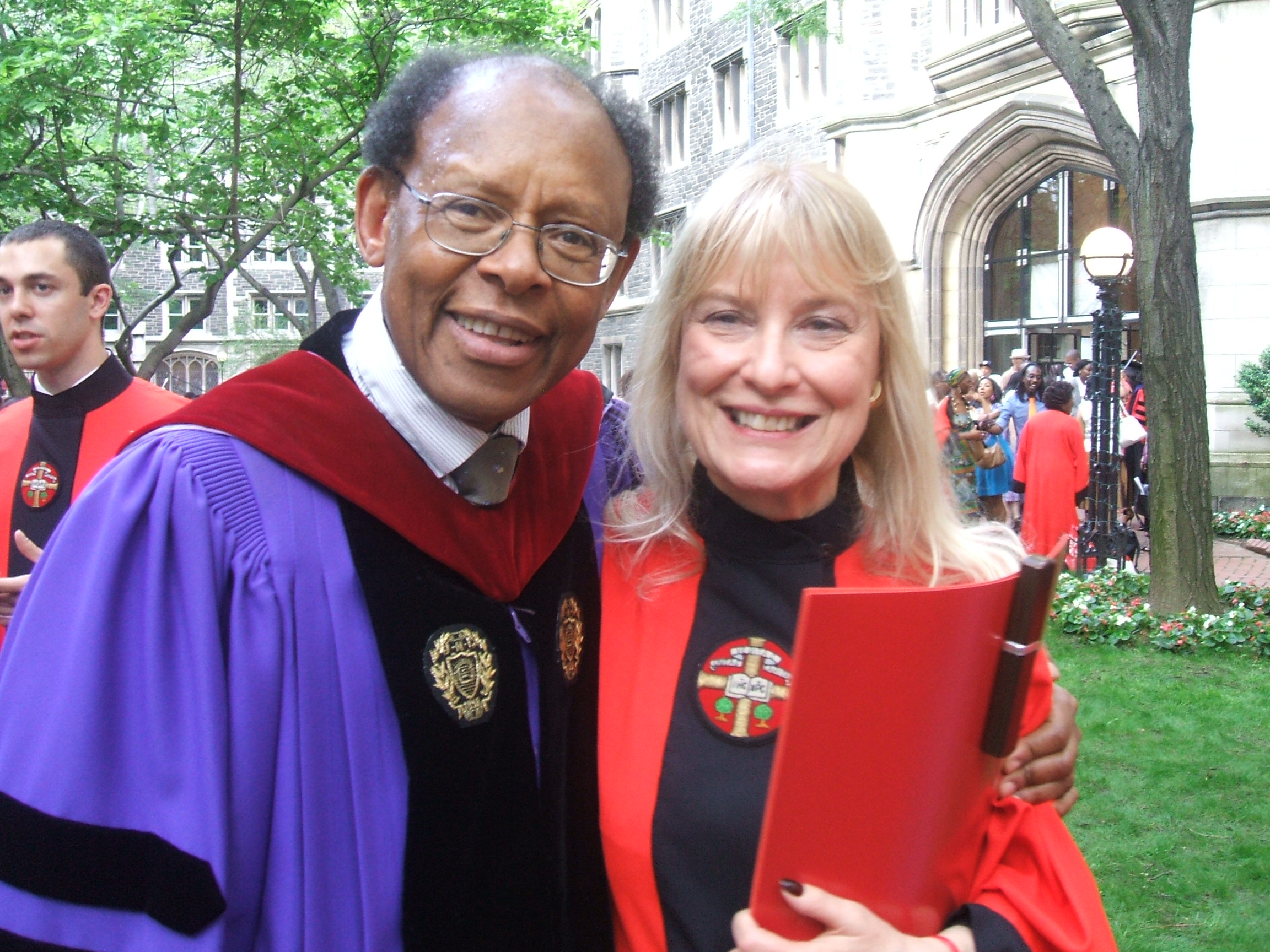
-Jane Duffield
I shall never forget Professor Cone’s words to our class on the last day of the semester for the course Foundation in Christian Theology, ST 103 in December 1993……” “Thank you for the privilege of being with you….there is no place I would rather be on a Tuesday morning, than right here with you.
Virginia Day M.Div., ’96
My thoughts are with the Cone family, the Union Theological Seminary family, and all who knew and loved Dr. Cone. My life is forever positively affected through his former students, his articles, and his books. I am grateful to have had ministers and lay-leaders who courageously shared the prophetic voice of Dr. Cone. A life well lived and a love well received.
-Sharaledon. Brave, Poet
I mourn your death. I was a theologian who always wanted to see me in my life. Your theology and the story will be eternal.
-yoo jaemoo
“The Imagination of Dr. Cone
James Cone was giggly; he loved to laugh. He had a high-pitched voice absolutely everyone could mimic once they’d heard it a few times. This theological giant, who drew people from across the globe to study with him at Union Theological Seminary, had a slight build and eyes that shined. You could see him jogging along Riverside Park on the Upper West Side with the old sweatpants that had elastic at the ankles. He was always friendly, even if he didn’t know who you were.
For two of my three years in seminary, he didn’t know who I was because I didn’t take his almost-but-not-quite-mandatory theology class. I was doing an internship and worried I wouldn’t have time for it, which is how I was. But in my last-ever semester, I took a class in which we studied Martin Luther King Jr. and Malcolm X. I learned with both amusement and fear that his style of teaching was to call on people at random, let them talk for a minute before stopping them and tell them he didn’t want to hear that. Nobody could digress, ramble or say anything that didn’t hit on the point Dr. Cone was after. He could shut down a bullshitter like someone who had half a century’s worth of them filtering in and out of his classes, and indeed he had.
It was fun to watch. I sat next to him in class and, though I was quiet, we bonded energetically, if you can get any sense of that. It wasn’t that I didn’t have a lot to say, but I was better at saying them in my papers, which was all right because he liked my papers. So that saved me. Over a period of months we said a few warm things to one another, and, though it wasn’t much, we built up a small kinship.
When one of the other professors retired, I sat next to him at her retirement ceremony and we had this rare, odd hour or two of seeing no one but each other. He clasped my hands and hugged me and we talked intimately the entire time. He asked me why I didn’t speak more in class, and I told him I was shy. He was instantly sympathetic. He said, “You know what? I’m shy too,” which made me laugh. I remembered the many times I had heard his voice reverberating through the hallways. No class failed to get him heated up, no matter how many times he taught it. But I could also imagine this bright-eyed theologian from Arkansas feeling awkward every once in a while. He was different, and it must have made him feel funny sometimes in gatherings of ordinary people, bricklayers and shopkeepers if he ever found himself in gatherings like that. It was fortunate for all of us that he found his home as the founder of Black Liberation Theology and in the gothic hallways of Union, writing books and giving speeches and letting everyone know that God was on the side of the oppressed — specifically, black people. Experiencing the brutality of whites in the Jim Crow-era South shaped his entire being. He had a lot to say about it, and he said it loudly, and as often as he could.
He was a champion not only of his people, but also of the idea that God and the gospels were on the side of the oppressed, not the oppressors. It was a radical idea. The Klu Klux Klan considers itself a Christian organization, as an example of how far afoul American Christianity could venture on the subject. He challenged white theology and theologians who said nothing during slavery, segregation, Jim Crow, lynching or any other brutality. He called out white Christians who were silent on race, and with a fierceness that commanded attention. And yet if you met him in the hall, or on the street, or in class, he was unfailingly sweet, a bubbling effervescence of a man.
His class came at a time when I had just started to feel truly uncomfortable about race. As a white woman, I had learned it wasn’t enough to decide you weren’t racist. You had to witness the damage it had some, at close range, to people you loved. It was like a forensic scientist having to examine the trajectory of a lethal bullet that tore into the skin of someone dear to you: once you felt it you could never be comfortable again. Dr. Cone’s classes forced us to witness that pain and the psychic and spiritual struggle that came from it, and it was sitting in his class that I realized the discomfort I felt was a fraction of what black Americans spend their lives feeling. I realized I could bear it, and that I could remain in that discomfort; I knew that I would.
After I told him I was shy, Dr. Cone never called on me again, even though I sat right next to him. He continued to praise my work, though, and, when I won an award for writing at graduation, he congratulated me and said, “I told you so!”
And when he died — I had only barely realized he was sick. But when he died, I had a vivid, visceral memory of this loving experience we had with one another, which encapsulated all that was transformative, sweet and unexpected in seminary. Those years were what we would call liminal space, magical in its transitory, uncertain nature, and Dr. Cone was the magician at the center, imagining himself and us past our preconceived notions and comforts and into a place of fierce truth, unlimited possibility and a non-negotiable, 60-second limit on bullshit.”
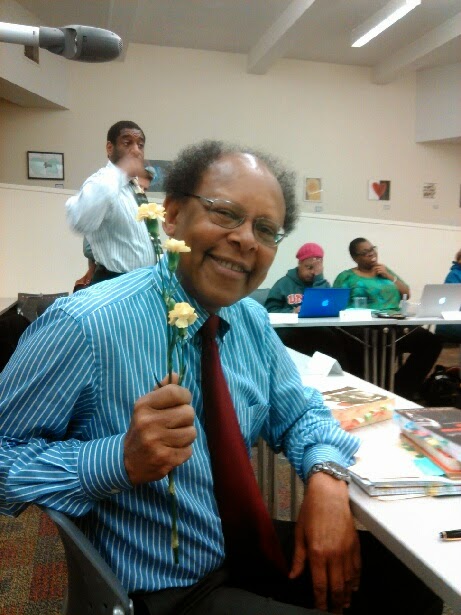
-Michelle Reiter
Words cannot express my gratitude for Rev. Dr. James Hal Cone. he changed, changes, and will change the world. now he rests in power with great ancestors and clouds of witnesses; I imagine that David Walker, Ida b. wells, Malcolm X, and Martin Luther King Jr. are just a few of those whose company he enjoys in a new realm of glory. It is most amazing, however, that though dr. cone’s impact and fame are global and time-transcendent, he “thought it not robbery” to be concerned with the lives of students like me. The memories are too numerous and precious to detail, but because of the personal connection he made with *me*, my life will never be the same: I celebrate the lessons he taught me about scholarly discipline, holy boldness, and precision and clarity of thought; I am eternally transformed through his demonstrations of his belief in me as a scholar; with thanksgiving, I will ever drink from the gourd into which he poured scholarly and spiritual investments for my professional and personal future. Thanks be to all-powerful, all-loving, and all-knowing essence for the great soul enfleshed as James Hal Cone. May all we who live in cone’s legacy — family, friends, and communities of scholars, activists, and religious leaders — be blessed with the fondest memories of his fearless and faithful service and live on according to the examples of conviction, courage, and care he set.
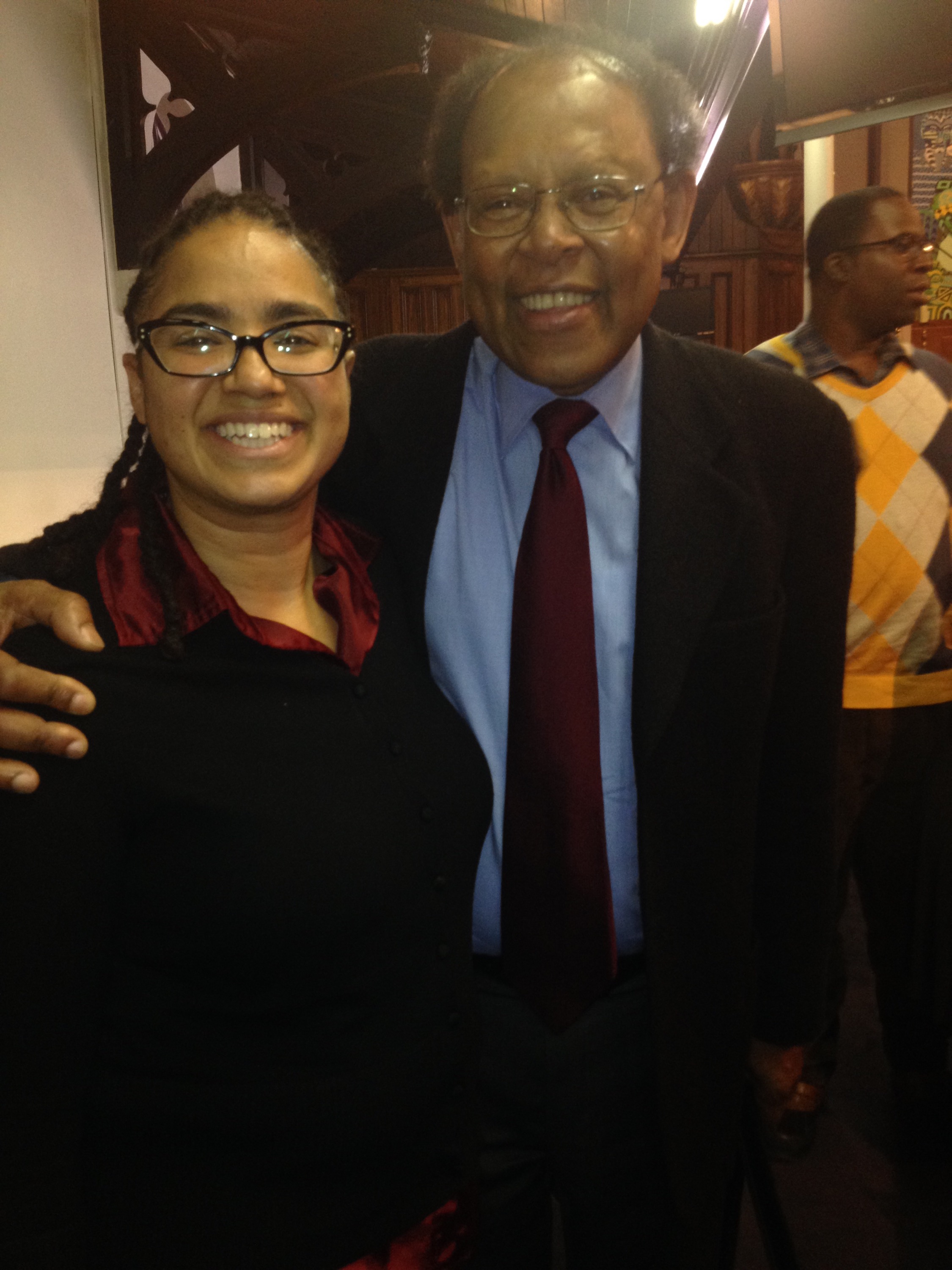
-Jennifer Leath
Dr Cone truly inspired me during my years at Southern Methodist University Perkins School of Theology get my MTS. Here he is at Rice University in 2014. I was blessed to hear him in person.
-Stephanie Simmons Johnson
I met Dr. Cone many years ago when I was a student at Spelman College. My sister was his brother Cecil Cone’s secretary. She preceded him in death last year (Dr. Janice E. Hale). Dr. Cone was sucha wonderful man. I remember him fondly. I know that Heaven is welcoming him with open arms.
-Marna Hale
Green Street, UMC in Winston-Salem, NC chose “The Cross and the Lynching Tree” as a focus for Lent this year (2018). Our Anti-Racism team hosted discussions on each chapter in the weeks leading up to Easter, and it deepened and clarified our theological reflections on what it means to recognize and align ourselves with Christ in the struggle for racial justice in America. We count ourselves among the many who are grateful for Dr. Cone’s life and work, and hope to help carry his legacy forward in our community. The collage below was made by participants in our book study as a special art event during Holy Week.
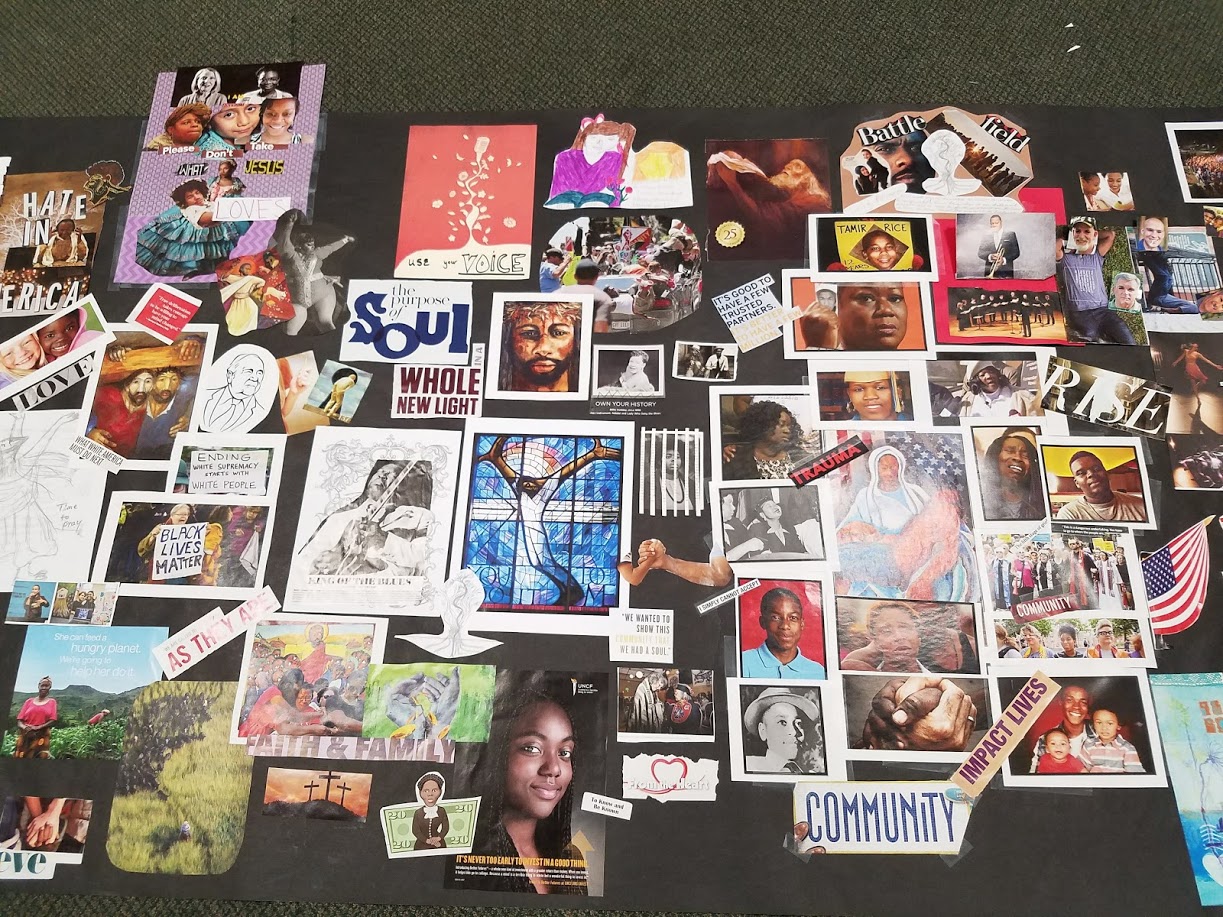
-Kim Strong
In the late 1980s I was asked by Professor Tom Driver at Union to explain and defend Cone’s Black Theology of Liberation to a class of graduate students. I was a white, southern, evangelical male in a group of people who were everything else. After dutifully preparing, I explained to the class that while Cone “made a good point” that his writing style was terribly offensive. How would evangelicals and white people ever even “hear” what he was saying if he could not even try more carefully not to offend? Needless to say, that day was a hard one for me, with a lot of anger and finger pointing (at me), and the rest of the semester in that class was awkward. But I met with Prof. Driver and Prof Larry Rasmussen often to work through things, and slowly I began to be thankful for the initial offense. Had it not happened, I would not likely have ever learned to see and think theology of the oppressed. Later I was fortunate to share with Prof. Cone this story. He laughed his characteristic, high-pitched laugh, and I thanked him for his life and work. He made a big difference in the worlds of theology, social justice, and good living.
-Stacy Patty
In reflection on the life of Dr. James H. Cone, I recall his coming to Detroit’s Oak Grove A.M.E. Church to share meaningful thought with those of us fortunate and ssensible enough to attend his lecture. I recall the proud moment, my niece, Rev. Sherisse M. Butler graduated from UTS, and afterwards, there, in the courtyard, we took photos with Dr. Cone. Dr. Cone, thank you, for speaking truth to power.——
-Fred V. Butler IV./ Minister of Music, St. Paul A.M.E. Church, Detroit, MI
Precious memories how they linder, how they ever flood ones soul. In my search for understanding Dr. Martin Luther King, Jr., and Malcolm X. I came across Professor Cone’ book: Martin and Malcolm and while I was in the wilderness I stumbled upon Dr. Cone’ lecture on The Cross and the Lynching Tree. I’ve been changed ever since. His passing is papable as if he was an immediate family member. And in some ways, he had become one to me, if only from afar. He caused me to visit Union Theological Seminary a lot more than I otherwise would have. I shall surely miss him…
A lotus to you… A Buhhda to be…”
– Gregory H. Smith
“Prof. James Cone was an intellectual giant, a remarkable teacher (mwalimu), and a beloved mentor. His life enriched us. He was bold, creative, and passionate. He was the strident voice of the voiceless and the veritable conscience of UTS. He was the quintessence of refinement in taste, conduct, and sensibility. A robust embodiment of the French bienséance or the Yoruba omoluabi. I fondly remember his magisterial presentations in his class: Theology from the Underside of History. Good night great teacher. Rest well good friend. Thank you for the richness you shared with us. I will miss you. May the ancestors warmly welcome you!
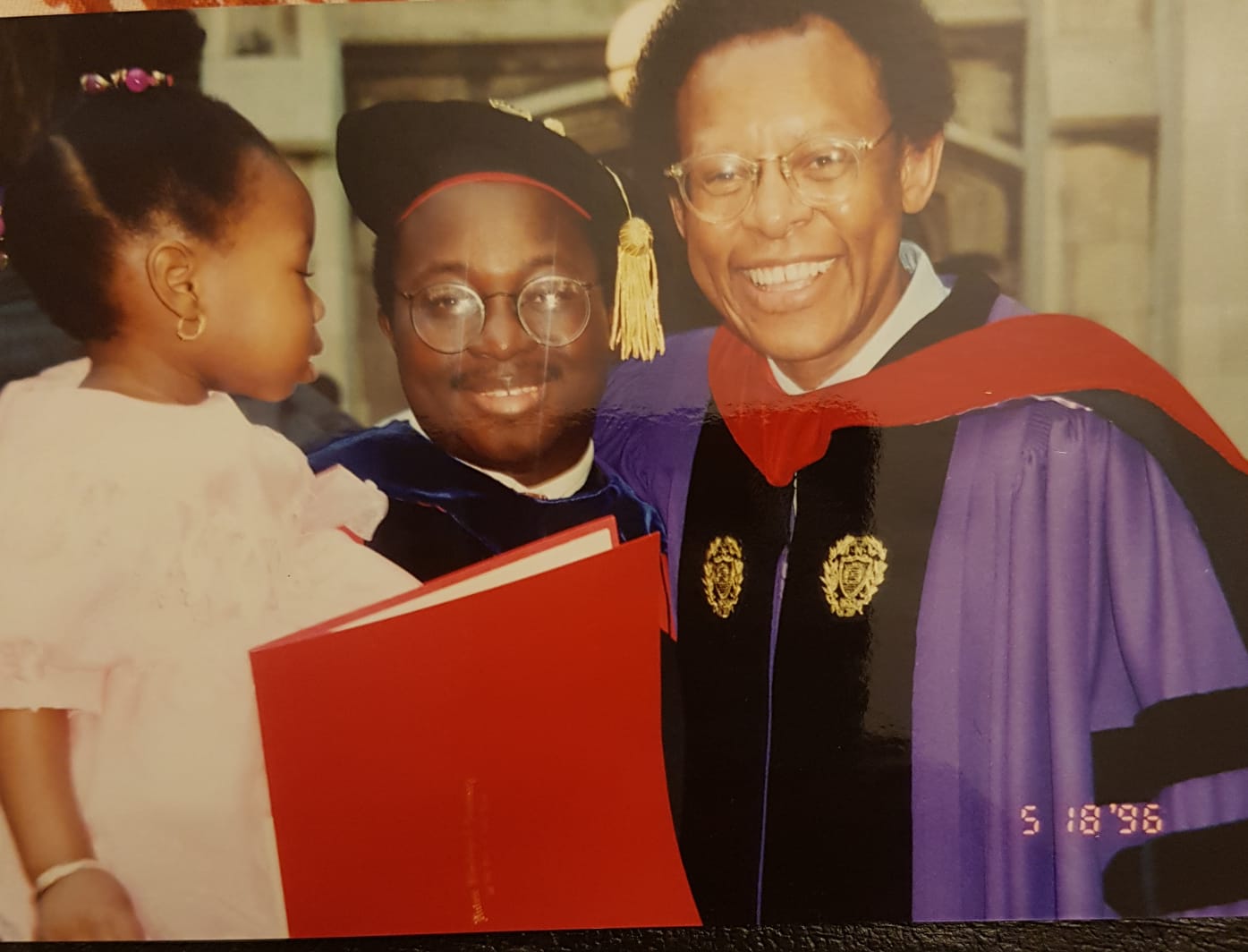
Akintunde E. Akinade, Georgetown University. Edmund E. Walsh School of Foreign Service in Doha, Qatar
I am deeply saddened to hear of the death of my dear friend and mentor of 40 years. My friendship with him changed my life forever as he inspired, mentored and encouraged me. I first met Dr. Cone while working in the Union Guest Housing reservations office as the young wife of a seminary student. I shared with him that I had heard him speak at my college and how his words inspired me to devote my life to those who were oppressed. Dr. Cone was always kind and encouraging to me from that moment. I sought his advice when I began teaching in a Headstart School in Harlem and 20 years later as I worked to finish my doctorate he was still my mentor and friend. We vowed to always stay in touch, but had not seen or spoken to him since 2015. I will never forget him, his humanity and compassion. My life changed forever because of his influence. Goodbye, my dear friend. I will miss you forever and always be grateful for the incredible gift of knowing you.
-Suzanne Fraser
I saw Dr. Cone speak at New Brunswick Theological Seminary and he was speaking about when he wanted to get another Ph.D. in Literature so that he could speak about the Black struggle similarly to James Baldwin, because he doubted that he could write well enough about the struggle at that point. But he said God made him realize that the struggle of Blacks was too urgent for him to go back to school to get another Ph.D., and if he didn’t have anything to say about it now, he’d never have anything to say. So that was when he realized he needed to write about the Black struggle from a theological perspective. It was studying Dr. Cone when I was a seminarian at Drew Theological, and hearing him speak that helped me develop my own voice as a Black Liberation Theologian and activist. May his legacy live on!!
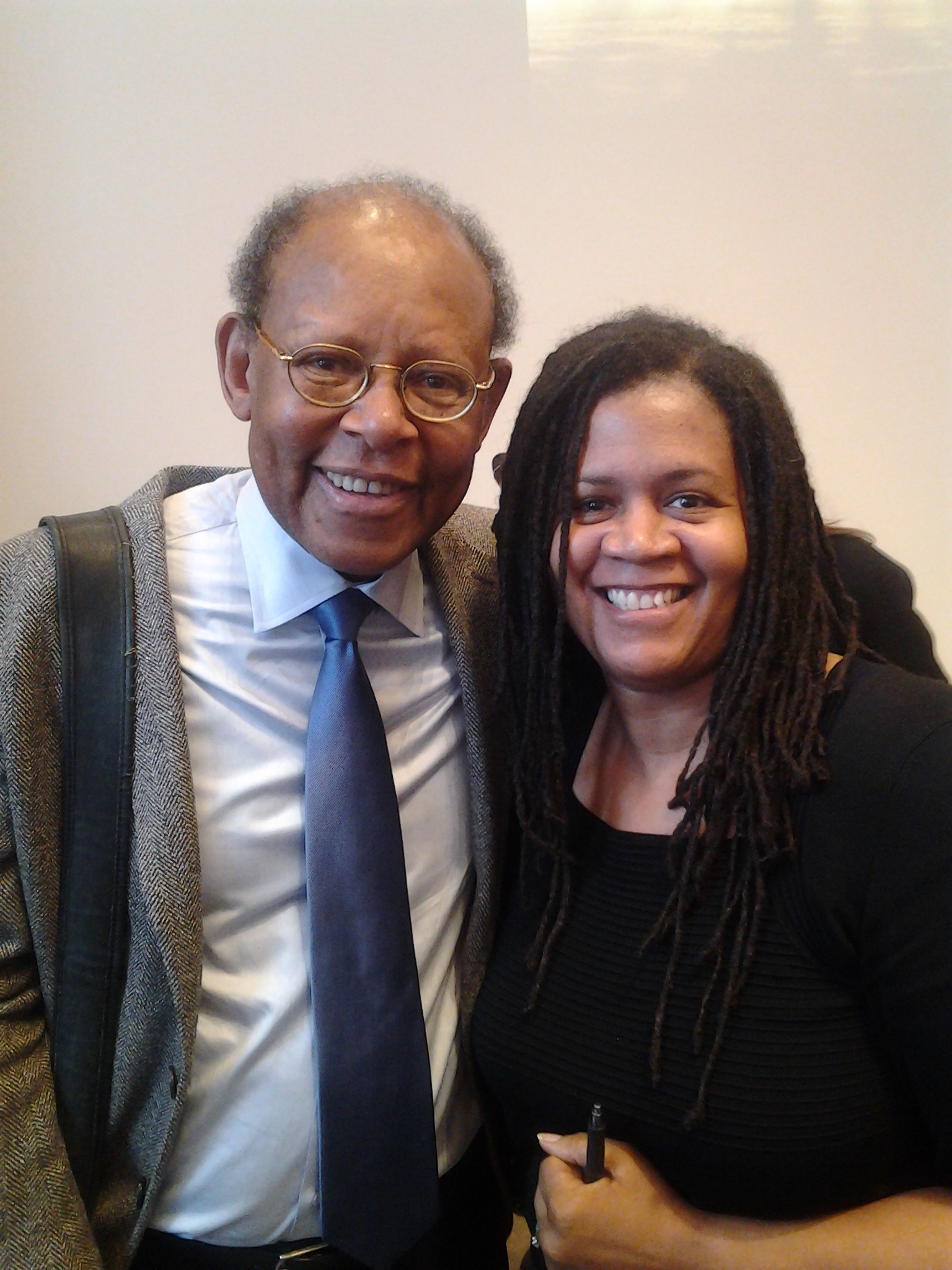
-Linda Wiggins-Chavis
“El pensamiento de James H. Cone es uno de los más potentes y proféticos de nuestro tiempo. Su fe en el potencial revolucionario del Evangelio ha movilizado a millones de personas en el camino hacia la acción emancipadora. Por ello, su influencia ha ido más allá de la población cristiana afro-americana de Estados Unidos y ha impactado en otros sectores de la cristiandad. Quiera Dios que su obra siga siendo un elemento firme en las mentalidades de quienes trabajan para el cambio social, dentro y fuera de las iglesias.
The thought of James H. Cone is one of the most powerful and prophetic of our time. His faith in the revolutionary potential of the Gospel has mobilized millions of people on the road to emancipatory action. Therefore, its influence has gone beyond the African-American Christian population of the United States and has impacted other sectors of Christianity. May God that his work remains as a firm element in the minds of those who work for social change, inside and outside the churches”
-Leopoldo Cervantes-Ortiz
Dr. Cone’s writings were essential in my formative years. His words will remain forever etched in my mine, spirit and actions. Peace and blessings. Randy Gunter
“In the Spring of 2016 when I was discerning between PhD programs, one evening I received a call from an unfamiliar NY number. I asked my wife to pause whatever we were watching on Netflix and I heard that voice everyone knows so well.
“Helloooooooooooooo? May I speak with Jaaaaames Hooooooward Hiiiiiiill, Juuuunior? This is James Haaaaaaal Coooooooooooooooone from Uuuuuuuuuuunion Theeeeeeeyoooooooooological Seeeeeeminaaaaaaary….”
After I wiped the tears from my eyes and tried desperately to maintain my composure while on the phone with my hero, Dr. Cone spent the next 5 minutes discussing how he read my paper *carefully* and thought it showed great promise. “I paaaaaaaaarticularly enjoooooooyed how you engaged with Maaaaaaaaaaaaaaaaaaaaalcolm and Faaaaaaaaaaaaaaaanooooooooooooooon! I love Martin…BUT I’M A MAAAAALCOLM GUY!”
After he finished discussing Union and why he felt it would be be a great fit for my research he asked, “Do you have any more queeeeeeeeestions for me?”
DO I HAVE ANY QUESTIONS FOR YOU?!?!?? DO I?!?! Doc Cone spent the next 20 minutes discussing with an unknown grad student from Temple Texas timeless gems about the state of the field, the responsibility of the theologian, and why I should never fear not finding a job once I finished. “You ain’t writin’ about dead white folks. White folks are tired of reading about dead white folks. No no no no no. Through your research, you are having a conversaaaaation with the world. And the world is ready to have a conversaaaaation with you.”
Thank you, Sir, for gifting us with your life. Asè.”
-James Hill Jr.
I am deeply saddened to know that my theological mentor and academic advisor during my time at Union Theological Seminary, Dr. James Hal Cone has passed on from time to eternity. I cannot fully articulate all that I learned from him, and how much he challenged me in a positive way to be my best, “worship God with my mind”, and strive to be a relevant theological voice for my community. Dr. Cone was not only the Father of Black Liberation Theology, but a father of generations of theologians, whose work always advocated for his people, the best of Christianity, and all the oppressed of the world. My only comfort at this time is to know that, God allowed me the unique privilege of being one of his students. The prophet is removed from us, the mantle has fallen, but his work and legacy will continue in the hearts he set ablaze with the liberating gospel of Jesus Christ in both pulpits and podiums across this world.
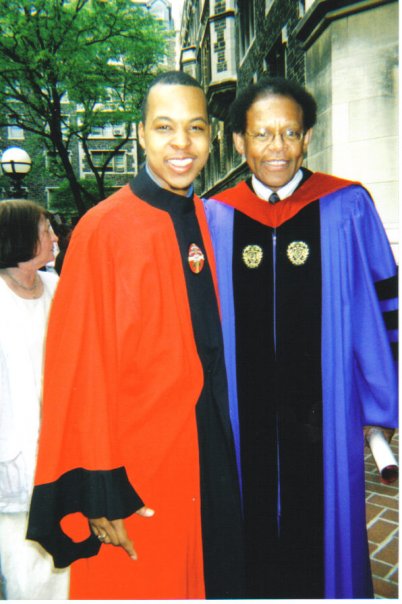
-Keith C. Braddy
I read Dr. Cone’s book on Martin and Malcolm in a class with Dr. James Turner at Cornell as an undergraduate. It changed my life and gave me hope and gave me language for understanding the beautiful church community that raised me in Detroit, Michigan. Dr. Charles G. Adams and Dr. Mangedwa Nyathi believed in our community standing up and organizing and knowing our place in world history. As people of promise we were to fight the violence and economic injustice of racism in Detroit and in Soweto. Cone’s work then gave me confirmation of a life’s work and purpose. May he rest in power!
-Dr. Tiffany Willoughby-Herard, Muckleneuck, TSHWANE, South Africa\
I heard Dr Cone at Bethel Baptist Institutional Church in Jacksonville Florida. My life was changed. I can’t read enough and I can’t hear enough. Thank-you Bishop McKissick for bringing him to Jax and thank-you Dr Cone for your wisdom that will change the world as we know it. God rest his soul!
Frank D. Coleman, Jr
Dr. James H. Cones work will forever live in the annals of history! Dr. Cone’s work in theology shall be remembered as a divine rights of passage.. which touched the very souls of all man kind!
-Mayor Torrance Harvey
“I arrived at Union the same year as Dr. Cone, a young white boy from Wisconsin. C. Eric Lincoln was still at Union, the established black sociologist welcoming the brash young African American theologian. As I experienced their presence at UTS, I found it ironic that the young theologian with the reputation of strident confrontation with white folk was actually the one who was cordial and easy to talk to.
Dr. Cone was a true teacher in his life and work. His direction on my thesis study of Nat Turner and the apocalyptic imagery of slave songs was patient and pivotally helpful.
When we went to see him at a lecture in Denver five years after my graduation, he spoke forcefully as usual, and then afterward greeted us warmly from across the room in the reception hall.
Years later he accepted my invitation to speak at Shippensburg University in rural, white Pennsylvania and again was cordial, warm and fully present.
Theologically he was a pioneer. As a human being, his life was a daily example of his faith and his caring for all.”
-Steven Sprecher
“Luke 23:31-32 NASB
“Then their eyes were opened and they recognized Him; and He vanished from their sight. 32They said to one another, “Were not our hearts burning within us while He was speaking to us on the road, while He was explaining the Scriptures to us?”
I did not know and had not felt what those early witnesses to the resurrection knew and felt, until my experience with Dr James Cone. This is closest to a resurrection appearance of the Christ that I have had in my lifetime.”
-Donald F. Guest
“James Cone was one of the great theological thinkers of the 20th Century. His contribution to the theory behind the liberation of the children of the slaves in the US cannot be undervalued. For me personally, his works were the first systematic-theological ones I actually found access to, in Glasgow. My thesis supervisor from Vienna received an honorary doctorate at the same time as professor Cone from the faculté protestante in Paris. Although I never got to meet him, Professor Cone was kind of “there” throughout my time at university.
I hope he will also be remembered for his deeds in updating theological language to make it more relevant for the present-day world, but also as relevant on a global scale, for scholars of all backgrounds, in all corners of the earth, be they theologians or people of faith.”
-Elizabeth Morgan-Bukovics
In 1994, my theatre company at the time, Ensemble Theatre Company of Newark, NJ, had produced a play that looked at the final 3 years of Dr. Martin Luther King Jr’s life, from 1965-1968 called “Roads of the Mountaintop” by the late Ron Milner. As part of our production, we had a panel discussing Dr. King and on the panel was Dr. Cone. It was one of the most important moments in my life, hearing his insight and passion regarding Dr. King. My life has been truly enriched meeting and seeing this great man in person. May God Bless Him!
-Marvin Jefferson
“Today, I remember how I felt when I first entered Dr. James Cone’s Black Theology class at UTS in 1996. I was terrified! Here I was entering seminary after having been away from academic work for over twenty years. Even then, I had never taken a course in religious studies. I had never heard of James Cone and didn’t know what Liberation Theology was. When Dr. Cone handed out his syllabus with a required reading list of twenty-one books, I thought I would die for sure! For a moment, I wondered if there were any way I could gracefully re-trace my steps, move back to SC. and chalk it up as an adventure. But after awhile I fond my rhythm and I became fascinated with Dr. Cone’s passionate lectures about God and the oppressed. I found resonance in my own compelling interest in social justice and self recognition as an agent for change.
Then one day Dr. Cone paid me the ultimate compliment, “”You have found your voice!”” I wasn’t quite sure what he meant, but I knew it was a good thing because I had received a grade of “”Distinction”” on my paper.
Just the other day, when I was pulling together some notes for a “”jazz vespers project”” for a local church congregation, I thought about Dr. James H. Cone and I pulled a copy of “”The Spirituals and the Blues”” from my book shelf. I smiled as I leafed through it, thinking about how much I cherished the memories of my days at Union Theological Seminary in NYC. …. the friendships forged, the heart -two-heart connections, the caring community, and the challenging professors. Dr. Cone is an integral part of my most cherished memories and I am proud to honor is life and legacy as I continue to draw from the “”spirituals and the blues”” of my own life in serving as a “”creative place maker,”” and catalyst for social change.”
-Velma Love, PhD
“I am deeply saddened by this news. I had the privilege of having Dr. Cone as a professor during my MA Studies at Maryknoll School of Theology. Among my most valued learning experiences and treasures from my Maryknoll days are several one on one conversations I had with him, each of his books – signed with personal remarks, the final research paper/exam from his course – with his signature comments – and a grade of an “”A”” . My profound respect and gratitude for his work has only deepened as I shared his work with students at Catholic Theological Union – and many other occasions elsewhere. Since I first taught the racial justice course at CTU – I’ve always assign his work to students – especially the commentaries on his work in the December 2000 issue of Theological Studies!
May we become worthy of all he gave us and truly learn to love one another!
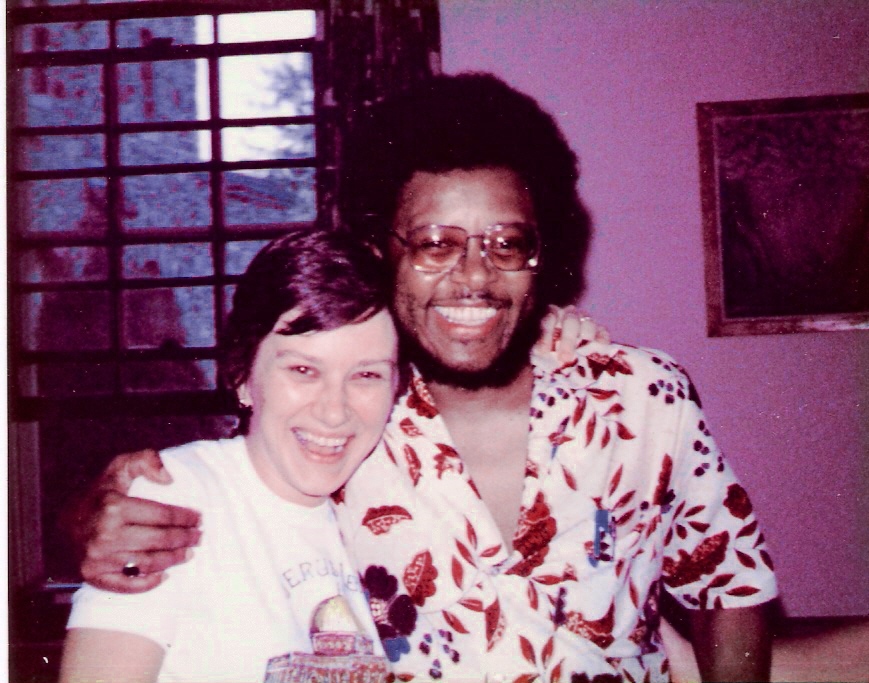
-Dawn M. Nothwehr, OSF, Ph.D., The Erica and Harry John Family Endowed, Chair in Catholic Theological Ethics, CATHOLIC THEOLOGICAL UNION
We will miss You – Dr. Cône! However, we will continue to speak your name! Your books will continue to allow us to speak Liberation! Thank you for pouring into many of us!
-Rev. Alicia Bailey
I was teaching a class on Liberation Theology this month in Fort Collins, Colorado, at First Presbyterian Church and had just presented details of James Cone’s writing and leadership when the news broke of his death. I went to Union Seminary because I had read BLACK THEOLOGY AND BLACK POWER in 1970. I wanted to study with him and I was in four of his classes and countless lectures that he gave. He was a gentle giant with amazing compassion and conviction. His words rocked the world into seeing the truth in love. Dr. Cone created vast ripples of awareness, love and justice that touched countless pastors, professors and prophets. Future generations will be enlightened and liberated by his reflections on the Word and the truth of its implications for love and justice.
-Rev. Dr. Gary Ritner
“This is my last picture with my dear professor, Dr James Cone. I thought I would be able to take another pic with him in coming commencement class of 2018, but now I cannot.
I was so honored to be in his last class, Black Theology, Spring 2017. I still remember his last class, last lecture and last voices in class. I couldn’t stop my tears at that time.
He always encouraged me to speak up my voice to build my own way against all kinds of prejudices as a minor Asian woman. He told me,””I always enjoyed reading your papers, because you had your own voices in your papers.””
He helped me to be a theologian who speaks about other’s grief, anger, despair and concern. I will not be able to forget your warm advice in my life.
May he rest in peace. Thank you for being my teacher.”
-Heeyoung Jung
Dr. Cone may describe himself “the angriest theologian” in the U.S. The way I remember him though is the loving and caring teacher. Dr. Cone was not afraid of people who would criticize/question him. He would openly talk with them. I for one may not agree with him 100%, but I admire his heart to talk with those who oppose him. Whether or not the talk would resolve the difference is another matter. I only took one seminar, one strong letter, and a couple of office hours from him, but I will cherish my memories about him. Rest in peace, Professor James Cone.
-So Jung Kim
My dear friend, Krystal, from one “activist kid” to another, I’m so sorry to hear of your loss. I’ve followed your Dad ever since we left Montgomery College. I’m currently in Alabama at the Peace and Justice Summit and, Bryan Stevenson, founder, quoted your father in one of Friday’s sessions — “The conspicuous absence of the lynching tree in American theological discourse and preaching is profoundly revealing, especially since the crucifixion was clearly a first-century lynching.” Love and prayers to your family, and may God give us the strength and hope to continue our father’s legacies!
-Racquelia “Rocky” Kilby
Thank You Prof. Rev. James Hal Cone for your works on the liberation
-Raffaele Paolo Coluccia
Shut up! Those were the words I said loudly as I read “God of the Oppressed” I was astounded to find a very different voice than the tradition white Western European theologians I had been exposed to. His was a new radically different perspective. His writings touched me, pushed me so far from my white suburban upbringing that I was forever changed. My copy of “God of the Oppressed” is full of highlights, margin notes, and dog ears. The binding is cracked, but this book holds the place of honor on my bookshelf. God bless you and keep you. May your writings continue to inspire seminarians, pastors and churches.
-Diane Badger
My heartfelt condolences to the Cones family. My prayers and thoughts are with you. I remember when Dr. Cone was invited to the Elmhurst College in Illinois. I attended that forum. I had read many books of Dr. Cone and I was elated to had met him in person. One of the most profound and memorable quotes I internalized from Dr. Cone was ” All Theology is contextual”. I had always been taught to read the Scriptures through a Europe centric viewpoint, until I read books from Dr. Cone. I was liberated from the bias worldview and distort viewpoints that denied the contributions and values of the black presence in the Redemptive history of God’s eternal plan for all people. I now know & understand that as a teacher of the Word of God, my content has to be relevant to my context. Thank you, Dr. Cone for liberating the Black mind from the distorted and bias views and doctrines of others.
-Unknown
He never sold out…he never gave up…giving himself up only & completely to God. Peace to those that “remain” behind…to those that “remain” in His Word.

-Peter Kupselaitis
I knew James Cone from Little Rock. My late husband Rabbi Elijah Palnick and James were friends and had many discussions about religion and theology. They greatly respected each other. James Cone will be missed. Irene Palnick. [email protected]
-Irene Palnick
“The time I (Jamye Wooten) hosted a reception for Black Scholars of Religion at the American Academy of Religion in #Baltimore.
Dr. Lisa Sharon Harper gave reflections, Dr. Allan Boesak was the keynote, and Dr. James H. Cone – The Father of Black Liberation Theology, came through to show support. ”
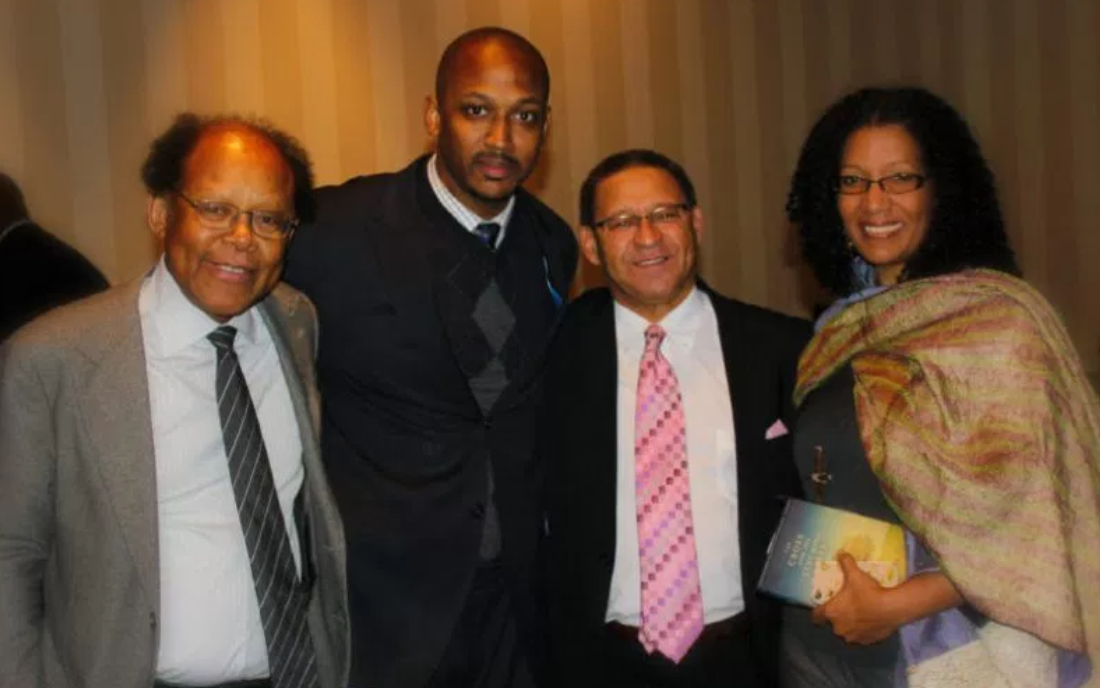
-JAMYE WOOTEN
I grew up in poor Black and Brown Chicagoland and received a scholarship to study at Wheaton College, where I studied theology. Reading “Divine Liberation and Black Suffering” from “God of the Oppressed” changed the course of my life. Cone helped me hold onto my Christian faith as it had been waning through the pages of white men who were detached from the realities Cone said God was found. After reading that chapter, I bought the three copies of the book (one for myself and two for others) and went home and read the whole thing. I started a reading group at Wheaton, entitled the “Black Theology Group” and a number of us met weekly to discuss books and articles from the Cone corpus. My commitment to Black Theology and Chicago led me to apply to the University of Chicago, where I am now, in order to study with Dwight Hopkins, Cone’s former student. I am currently in his class now. That chapter from “God of the Oppressed” changed my life forever and I always wished I could have met Cone personally. Maybe one day, on the other side of eternity, that will happen.
– Matt Vega
I first learned about James Cone in college, and he became one of the primary reasons I wanted to study at Union. I was born in Arkansas, and lived in Bearden during middle school. In high school, we lived in Pine Bluff and my mother was a special education teacher in the elementary school where Charles Cone was the principal. After one of the first lectures he gave in ST103 during my first year, I decided to introduce myself. When I said I had grown up in Bearden and that my mom worked with his brother, he laughed his big laugh and said, “Really?!”, with that trademark inflection in his voice that amplified all of the prophetic words that poured out of him. Somehow, full of graciousness and sincerity, we were able to connect around our Arkansas heritages. My experiences as a white kid in the 90s and 00s were vastly different than his, and yet we shared something. I am still stunned when I think about this. As an M.A. student, my time at Union passed quickly, and Dr. Cone was on sabbatical during all of my second year. But he always greeted me with a big smile and asked, “How is your mother?” At commencement, I was able to introduce him to my parents, and he spent several cherished minutes chatting with us about Bearden, his brother, and then he complimented my work. He wasn’t my advisor, and I only took one class with him, but we talked together several times and he saw me. He inspired me. He helped me find my voice.
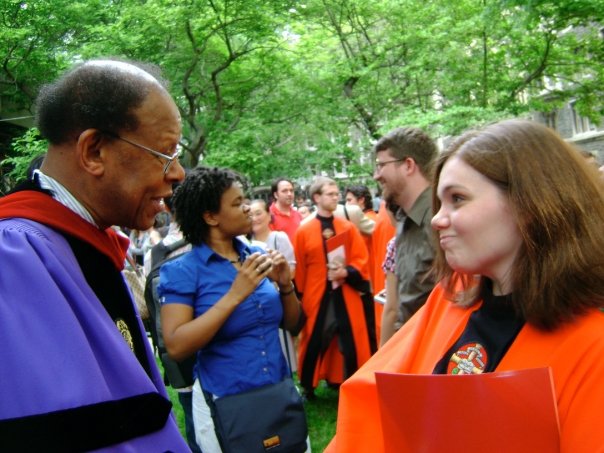
-Anna DeWeese
“I never met DOCTOR CONE
HOWEVER he was And is the reason I will Never back In fighting the Racism in our Church’s,
It is destroying so many lives, Thank you Doctor Cone for BEING such an inspiration.
-Pastor Ron Ballew
James Cone was the first theologian who spoke to me, who spoke the Gospel into my life and my situation. It is his work and his legacy that inspires me daily in my own theological studies. I wouldn’t be a theology student if it wasn’t for James Cone.
“I wrote about Dr. Cone recently on my blog:
https://carmenjoyimes.blogspot.ca/2018/03/racial-injustice-today-part-four.html
Grateful to him for bringing a dark era of US history to my attention.”
-Carmen Imes
Love you Dr. Cone- Tim (and Mom)
-Tim Burger
James Cone is the reason I got a PhD. I originally went to Union with the expectation of getting a PhD/MSW and going back to my organizing/social work life afterwards. But he put a note on my midterm that said “please see me.” When I went to his office, he said he wouldn’t let me leave his office until I agreed to get a PhD. He’s also the reason why I’m still a Christian. It’s hard to think of anyone who has had a greater impact on my theological or intellectual life.
-Andrea Smith
Dr. Cone’s unwavering commitment to this central theological foundation has served as a thorn in the side of western theology, which has often sought to justify oppression, & as a source of inspiration in the spirits of those seeking to be true to the prophetic call of God.
— Rev. Dr. Barber (@RevDrBarber) May 1, 2018
Dr. James Cone: well done, good and faithful servant. Mourning a friend, teacher, and mentor. Absolutely heartbroken at his passing. pic.twitter.com/K6NHfQBr73
— Yolanda Pierce (@YNPierce) April 28, 2018
Rest in liberating Power to our prophet of the ages, Rev. Dr. James Hal Cone
— Stephen A. Green (@GreenTheRev) April 28, 2018
James Cone’s legacy is of ongoing challenge to achieve the liberation of black people, the poor, the oppressed as the essence of Christianity. His work sparked my scholarly interest in #AfricanaReligions and I am grateful to have known him. Rest in power.
— Judith Weisenfeld (@JLWeisenfeld) April 28, 2018
I want to share what Ancestor James Cone meant to me, and the relationship he and I had. For me, his loss isn’t just about losing a Professor whose class I took, but about losing a Professor who inspired me *personally.* And I am so grateful to him. #JamesCone
— Jorge J Rodríguez V (@JJRodV) April 28, 2018
Just found out that the great black liberation theologian James Cone has passed away. Wow. What a giant, a luminary who taught us we could be unapologetically black in wrestling with our faith. So grateful for his impact and legacy. Words can’t do justice.
Rest in Power. pic.twitter.com/NmOPKRXpBz
— Daniel José Camacho (@DanielJCamacho) April 28, 2018
We lost another giant today. Rest in power Dr. James Cone
— Eddie S. Glaude Jr. (@esglaude) April 28, 2018
My Goodness.
Few people have shaped my theology and worldview more than James Cone.
What a loss for us all. Grateful for his life of leadership and liberation.
Sending love to my @UnionSeminary family as well. https://t.co/m4CJIzbfgs
— Shaun King (@ShaunKing) April 28, 2018
James Cone lectured at Princeton Seminary when I was a student. After his talk, we ended up on the same train and commuted back to NYC. He was a gracious conversation partner despite being tired. He told me “write the book.” Well, Dr. Cone, I did. May you Rest In Peace and Power.
— Darnell L. Moore (@Moore_Darnell) April 28, 2018
were shared by my maternal grandmother. To hear God’s voice of liberation in a tongue native to my soul will never be lost on me.
Thank you, Dr. Cone. pic.twitter.com/qI8JxT600e
— Broderick Greer (@BroderickGreer) April 28, 2018
There simply aren’t enough words to describe the enormity of James Cone’s theological impact, nor the void he leaves in our @UnionSeminary community. In 50 years teaching here, he changed the world—and every day electrified our small corner of it with his power and brilliance. pic.twitter.com/zB2advccKd
— Serene Jones (@SereneJones) April 29, 2018
James Cone has passed. He will be missed. He’s inspired me and agitated me in ways that have made me a better Muslim.
“All white men are responsible for white oppression. It is much too easy to say, “Racism is not my fault,” or
— Suhaib Webb (@ImamSuhaibWebb) April 28, 2018
The world has lost one of its greatest living theologians. James Cone
1938-2018
Rest in Power, my brother. pic.twitter.com/cAKDoNQhWh— Shane Claiborne (@ShaneClaiborne) April 28, 2018
“The Cross and the Lynching Tree” was among the books that radicalized me. It and his other works paved the way–through their strengths and their gaps–for classic works in womanist theology and political theologies across the field.
— Ari C. (@lit_ari_ture) April 28, 2018
We lost a luminary this morning. #JamesCone, the father of Black Liberation Theology, can go on home knowing that the prophetic tradition could not be more timely than right now. It’s on our generation to carry it forward. Thank you ancestor 🙏🏿
— James E. Ford (@JEFordNCTOY) April 28, 2018
Theologian James Cone (1936-2018) fanned a Fire in me that will NEVER fade.🦋
— Maureen Theresa Dean (@maureen_on) April 28, 2018
#JamesCone death won’t get mourned by America like #BillyGraham. And that’s how you know, Cone’s gospel sought our liberation.
— greenevictor (@Victor_Greene44) April 28, 2018
Saddened that Dr. James Cone has died. Decades before #BlackLivesMatter, Dr. Cone wrote that just as Jesus identified with the oppressed, so must white Americans become ontologically Black. Like a prophet, he incited righteous indignation and inspired hope. @EBONYMag @AP @NAACP pic.twitter.com/c6gGjom4Nw
— Rev. Cornell Wm. Brooks, Esq. (@CornellWBrooks) April 28, 2018
When I think of James Cone, I think of this larger than life theologian, this man with a fierce and joyful personality, this excellent teacher who expanded my world and so many others. But I also think about the man, in the back of the chapel, just listening.
— Ashley D.B. (@yinzerrev) April 29, 2018
The oppression of the poor, and black people in particular, was at the heart of James Cone’s work, and, as he wrote so prophetically and brilliantly, the love of the oppressed and divine passion for justice is at the heart of God. https://t.co/k9u0MR79cg
— Jim Wallis (@jimwallis) May 3, 2018
James Cone reoriented my understandings of Jesus as the Oppressed One, the incarnation and crucifixion as Divine solidarity with the oppressed, the whole telos of Christianity as liberation, Blackness as holy, Whiteness as demonic.
— Rachel Cohen (@pwstranger) April 28, 2018
Dr. James Cone was unwavering in his commitment to God and Gospel. He, as prophets do, called us to see God more clearly and live life more faithfully. We are indebted to his passionate work.
Rest In Power. We are forever changed because of you. pic.twitter.com/nI2LEvYlBP
— Queer Theology (@QTheology) April 28, 2018
i’m heartbroken to learn of his passing. not because he was my advisor, or because we had a close relationship. but because i was his student, and the ground i occupy exists because he was courageous enough to break it.
— neichelle guidry, phd (@neichelleg) April 28, 2018
You taught us to live unashamedly Black and unapologetically Christian. You taught us that liberation is not only freedom from, but freedom to.
Rest In Peace & Rise in Power!
Well done, thy good & faithful Servant.#JamesCone pic.twitter.com/GOUENCWjNY
— J. Lee Hill, Jr. + (@RevDrJLHj) April 28, 2018
Rest In Peace to the legendary James Cone, who passed away earlier today. The man was an intellectual giant.
— Marc Lamont Hill (@marclamonthill) April 28, 2018
I’m so sad to hear of the passing of Dr. #JamesCone. The beating heart of Christian Theology is Black Liberation. Thanks Jim for showing me what a theological life of prophetic integrity, razor-sharp rigor, and large-hearted love looks like. pic.twitter.com/BoDcnm3Orr
— Peter Heltzel (@PeterHeltzel) April 28, 2018
I am consumed with sadness over the death of Dr. James Cone. No theologian influenced me more than Dr. Cone. Thank you, Dr. Cone, for helping generations of African American Christians, including me, to live authentically and to claim, without apology, Jesus as liberator.
— Dr Jack Sullivan Jr (@JackSullivanJr) April 28, 2018
He thought, wrote, and taught for his own freedom, and helped us get free indeed. We who refuse to lay aside Blackness in order to believe – we are so damn grateful. We miss you already, Dr. James Cone. @unionseminary pic.twitter.com/lBGhcn5ZSc
— NWashingtonLeapheart (@oholyshift) April 28, 2018
James Cone. Forever changed my theology and my commitment to Christ and what the church is called and should be about.
Rest in peace and power, Faithful One. pic.twitter.com/zgSH5ems1g
— Jes Kast (@JesKast) April 28, 2018
I am processing the news of Dr. James Cone’s death and my heart is heavy.
I am a practical theologian by training and I would not understand who I am as a black person and how God has a heart for the oppressed without Dr. Cone.
— Rozella Haydée White (@rozellahw) April 28, 2018
A distinguished preacher, teacher, scholar, mentor, and Christian gentleman has passed.
Rev. Dr. James H. Cone helped to shape my theology and social justice advocacy around the fact that “any authentic theology must affirm that God is on the side of the oppressed.”
Rest in Him pic.twitter.com/TMjWbUe3e0
— Bishop Talbert Swan (@TalbertSwan) April 29, 2018
I had the honor of taking courses from James Cone at @UnionSeminary. I always described his classes as half-lecture/half-sermon. It was the only class where the end of the lecture would be applause. His theology and pedagogy impacts my ministry and my life every day #JamesCone
— Alan Dicken (@AlanDicken1) April 29, 2018
In the classroom, he challenged me. In his books, he inspired me. In his presence, he encouraged me to speak truth to power and prophesy freedom. Always. A Puerto Rican Decolonial Theology wouldn’t have been written without him. Rest in power #JamesCone https://t.co/AXxpA0xlaR
— Teresa Delgado (@drteresadelgado) April 28, 2018
One of my beloved professors James Cone has died. His word has not died, the power of his his vision has not died, those of us who heard the true word he spoke carry it with us in gratitude and in debt. Black liberation. God is Black. Rest in power. pic.twitter.com/92VJQmOEse
— Paul Brandeis Raushenbush (@raushenbush) April 28, 2018
RIP to my former professor and mentor James Cone. I would never have done a PhD were it not for him. His teaching and writings changed the way I understood theology and our world.
— Michelle (@michimald) April 28, 2018
James Cone showed us that another theology is possible. One that includes different voices. One that embraces different perspectives. One that liberates us to see God in a different and powerful way. We will keep dreaming your dreams and walking your walk, #JamesCone
— recabral (@recabral) April 28, 2018
Dr James Cone passed away. I’m so incredibly sad for the whole world. We lost a giant. I’m so grateful to have had the great privilege of studying with him. He listened to my music and watched my videos and said “it is clear you are meant to do this.” He pushed me to grow….
— the most mona (@mona_haydar) April 28, 2018
His work expanded & changed my theology, encouraged me to be my own theologian & will be studied by me forever! I’m so thankful I got a chance to hear him a few months ago! #BlackExcellence #jamescone https://t.co/ofFCU1rME1
— Janelle Bruce (@revjanelle_esq) April 28, 2018
